Isaac
Malevu
leading the IDC’s finance portfolio to greater heights
Gugu Mkhize
realising transformation through excellence





Celebrating Human Rights Month

Isaac
leading the IDC’s finance portfolio to greater heights
realising transformation through excellence





Celebrating Human Rights Month
8. Conversations with leaders
New Higher Health CEO Dr Ramneek Ahluwalia intrusted with protecting SA’s student life.
10. Women in the public sector
INSETA CEO Gugu Mkhize brings leadership excellence to the insurance training industry.
14. Trailblazer
Senzo Ndlangamandla brings transformation to Walter Sisulu University’s Department for Accounting Sciences.
16. Profiles in leadership
CFO Isaac Malevu is leading the Industrial Development Corporation (IDC)’s finances to calmer waters.
18. Office of the President
Milestones towards a more professional and effective public service.
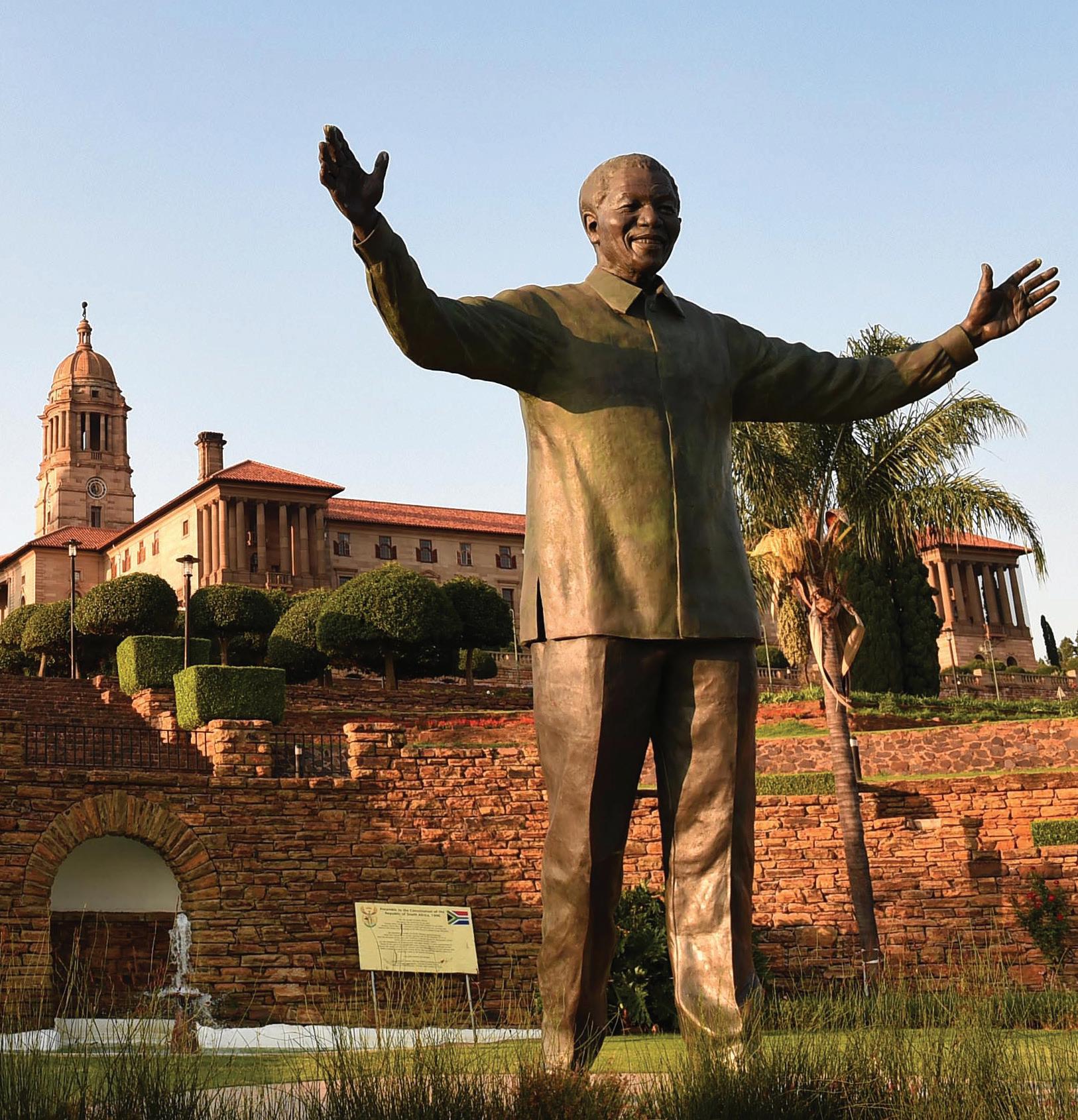

20. Developmental local government: two decades of progress
Local government ushers in an era of progress at grassroots level.
24. Improving the delivery of water and sanitation services
Water Services Authorities Summit promises greater access to safe water
28. Simplifying water services planning
Municipalities can take ownership of water services with online planning system.
30. Yes, we can end TB!
SA is intensifying its fight against tuberculosis
32. Clarens takes control of own electricity demand
Tourist destination goes from art town to smart town in managing load shedding.

34. We've come a long way, but still have far to go The GCIS’s Tasneem Carrim reflects on 30 years of freedom and democracy in South Africa.
36. Accessing accurate public information Government takes proactive steps to fight fake news.
38.Money moves for a successful year Tips on how you can create a solid foundation for financial freedom.
40. Climate Commission welcomes Climate Response Fund announcement Climate Change Bill will pave the way for an effective climate change response
42. Showing up for SA Succumbing to our challenges as a country is not an option.
44. Treasury taps into foreign exchange account to reduce debt service costs Budget Speech tackles reduction in government borrowing..
46. Empowering the Public Service: A New Dawn of Accountability and Excellence DPSA Directive on Development for Public Service Professionalisation to create a better public service.
52 14

50. Food and wine Celebrating 30 years of freedom and democracy through indigenous food
52. Travel Take a bush break in Marakele
As we approach the significant milestone of 30 years of South Africa’s Constitutional Democracy, it is crucial for us as a nation to take stock of the progress we have made in advancing human rights.
To foster this important discussion, the Department of Justice and Constitutional Development will be hosting a National Conference on the State of Human Rights in the country this month, March 2024. The theme of the conference is "Three Decades of Respect for and Promotion of Human Rights."
This conference will provide an opportunity to reflect on the milestones achieved and chart the way forward in advancing human rights in South Africa.
The Universal Declaration of Human Rights (UDHR), a cornerstone document adopted by the United Nations General Assembly in 1948, laid the groundwork
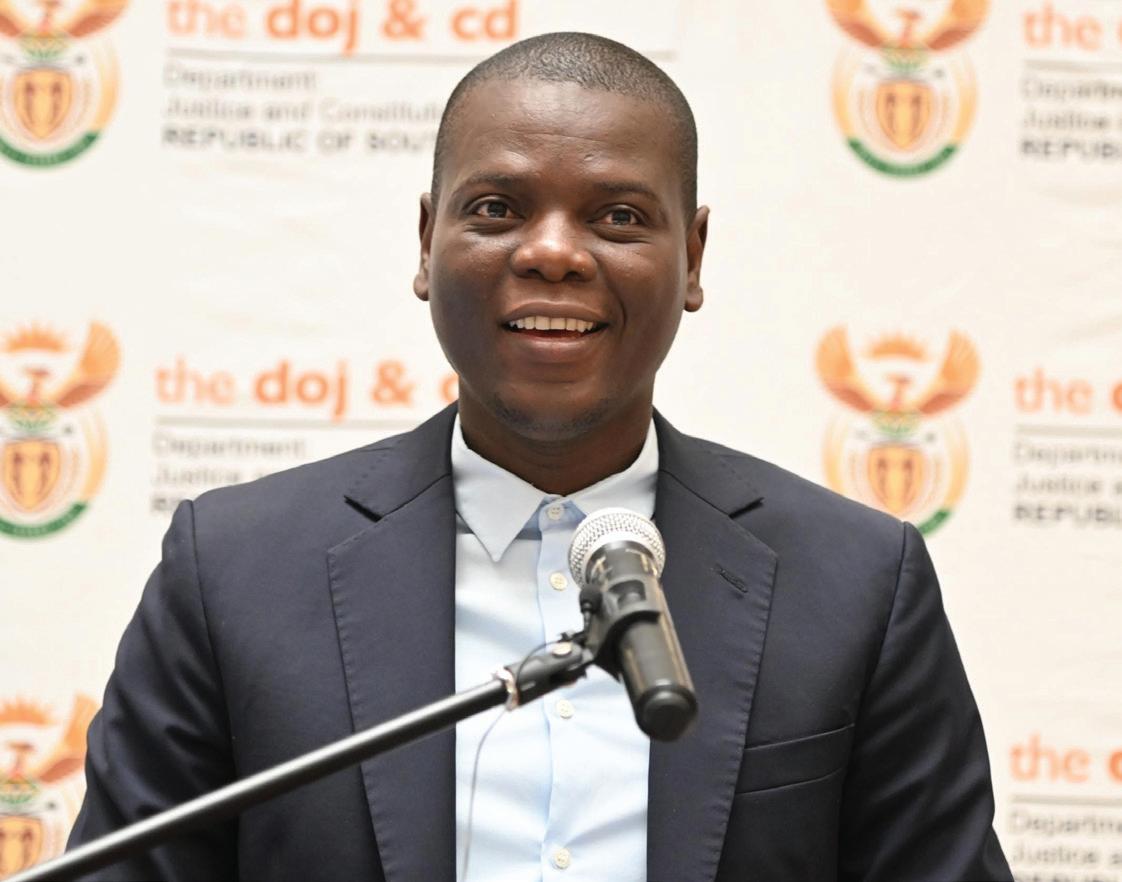
for human rights principles globally. Building upon this foundation, South Africa, guided by the leadership of the first democratically elected President Nelson Mandela, enshrined human rights into law with the signing of the Constitution of the Republic of South Africa of 1996.
This Constitution, inspired by the principles and values of the
UDHR and the Freedom Charter, is the bedrock upon which our commitment to fundamental rights and freedoms is built.
The conference aims to foster public dialogue and collaboration among all stakeholders to nurture a culture of human rights. It will provide a platform to reflect on existing and proposed legal frameworks,
jurisprudence and mechanisms. With the participation of international stakeholders, the conference will also create an invaluable opportunity for comparative learning and peer exchanges on strategies to protect and promote human rights. Through exploration of sub-themes such as governance, rule of law and economic rights, the conference will examine our legal frameworks, identify gaps and formulate recommendations to address challenges impeding the full realisation of human rights.
South Africa has made significant strides over the past three decades in upholding human rights, transitioning from the shackles of apartheid to the dawn of democracy. However, amidst our progress, challenges persist. Issues such as poverty, inequality, gender-based violence (GBV), discrimination,
and exclusion continue to cast shadows on the landscape of human rights in our nation. The conference presents an opportune moment to confront these challenges head-on and devise strategies to surmount them.
Central to our journey towards equality is the celebration of South Africa's Bill of Rights, enshrined in the Constitution, which stands as a beacon of hope and progress globally. Its comprehensive protection of civil, political, economic, social and cultural rights serves as a testament to our commitment to promoting dignity, freedom and wellbeing for all our citizens.
The Department of Justice and Constitutional Development has embarked on a number of programmes as part of the effort to enhance access to justice for all. These include the rationalisation them to align magisterial districts with municipal boundaries, thereby ensuring that people are served by the courts closest to where they live. By aligning magisterial districts with population densities, we seek to ensure that judicial services are more accessible and responsive to the needs of our diverse citizenry.
Additionally, the department is implementing various initiatives to enhance access to justice, including expanding Legal Aid services to deliver quality legal aid and legal advice services
to the indigent and vulnerable, promoting alternative dispute resolution mechanisms, integrating technology into the justice system, and investing in public legal education.
These holistic measures reflect our commitment to ensuring that all individuals can exercise their rights and seek redress in a fair and effective manner.
Women empowerment has been a cornerstone of South Africa's progress in advancing human rights. Over the past three decades, we have witnessed remarkable strides in the empowerment of women in various spheres, including the judiciary and legal professions.
There has been a notable increase in women's representation in key judicial positions, breaking barriers and enriching decision-making with diverse perspectives. Additionally, within the legal profession, women lawyers are increasingly occupying leadership roles and shaping the direction of the profession, contributing invaluable knowledge and skills.
The protection of women against GBV has been a key priority of government in the past 30 years. To this end, we have worked closely with non-governmental partners to strengthen legislation and close down loopholes used by perpetrators to evade prosecution.
Moreover, South Africa has implemented various legislative measures to promote and protect women's rights. The Promotion of Equality and Prevention of Unfair Discrimination Act of 2000 prohibits discrimination on various grounds, including gender, and promotes equality in all spheres of life.
In addition to the empowerment of women, we must also recognise the importance of fostering inclusivity and diversity in all aspects of society. This includes ensuring equal rights and opportunities for all individuals, regardless of sexual orientation or gender identity.
South Africa has been a pioneer in LGBTQIA rights, notably legalising same-sex marriage in 2006, making it one of the first countries globally to recognise marriage equality. However, despite legal advancements, challenges such as discrimination, violence, and stigma persist. The conference will provide a platform to address these issues and reaffirm our commitment to equality and inclusion for all individuals.
Furthermore, as part of our commitment to combating all forms of discrimination, South Africa has developed a National Action Plan to Combat Racism, Racial Discrimination, Xenophobia and Related Intolerance. This plan outlines compre -
hensive strategies to address systemic racism, xenophobia and other forms of discrimination in our society. The conference will provide an opportunity to assess the implementation of the NAP and identify areas for improvement to ensure that all individuals are treated with dignity and respect.
The National Conference on 30 years of the State of Human Rights represents a pivotal moment in our journey towards a more just, equal, and inclusive South Africa.
By reflecting on our achievements, acknowledging our challenges and collectively charting a course for the future, we reaffirm our unwavering commitment to upholding and advancing human rights for all our citizens. I urge all stakeholders to actively engage in this important dialogue and together, let us build a nation where the principles of dignity, equality, and justice are not just enshrined in law, but are lived realities for all.
Join us as we commemorate three decades of advancing human rights in South Africa and embark on an important journey towards the realisation of our nation's aspirations.
Together, let us strengthen our commitment to upholding the principles of equality, justice and dignity for all. ❖
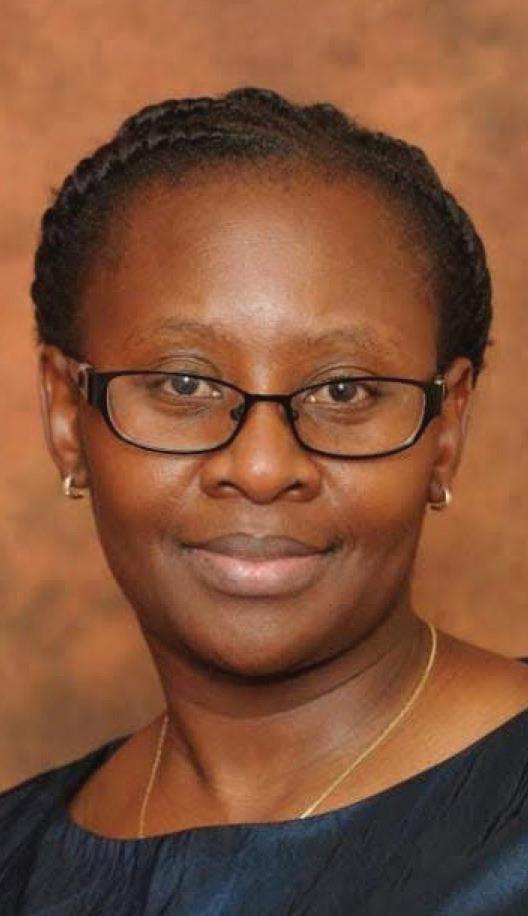
As we commemorate Human Rights Month in March, we should reflect on the painful, yet victorious journey travelled by South Africans to achieve basic human rights. On that note, we also proudly celebrate 30 Years of Freedom this year.
It is important to remember that the human rights we enjoy today did not come on a silver platter.
Gallant men and women from all walks of life had to fight hard against the apartheid regime, and many lost their lives, to ensure that we enjoy freedom and democracy.
As we celebrate Hu-
man Rights Day on 21 March, which commemorates the Sharpeville Massacre, where 69 people who were peacefully protesting against pass laws were killed and 180 wounded by apartheid police, we must foster social cohesion and nation-building. During apartheid, various draconian laws entrenched racial segregation and controlled the movement of black people in urban areas. For example, in terms of the Native Laws Amendment Act of 1952, black people could not travel from a rural area to an urban area without a permit from the local authorities and they had to
obtain a permit to seek work within 72 hours.
After refusing to endorse the United Nations’ Universal Declaration of Human Rights in 1948, the apartheid regime continued to oppress the majority of South Africans by imposing restrictions that prevented them access to certain public amenities such as beaches and public toilets.
Under apartheid rule, black people were not allowed to vote or openly engage in politics, and were barred from owning property in the suburbs, among others. Job reservation prevented suitably qualified black people from occupying
certain employment positions.
Following the dawn of the hard-won freedom in 1994, the democratic government undertook the mammoth task of redressing the social ills of the past by transforming the country’s socio-economic and political landscape.
At the time the country’s income distribution was racially distorted and South Africa was among the most unequal societies in the world. Women, in particular, were subjected to gender discrimination and bias while rural people and youth were marginalised.
Thanks to the Bill of Rights, as enshrined in the Constitution of the Republic of South Africa of 1996, South Africa now upholds the rule of law that promotes and protects basic human rights for all, regardless of race, colour or creed.
To redress the imbalances of the past, government introduced various programmes and policies aimed at ensuring a better life for all, particularly the historically disadvantaged.
Government has since implemented various laws that seek to redress the injustices of the past. The Employment Equity Act of 1998 aims to achieve equality in the workplace, thus eliminating unfair discrimination and creating a diverse workforce representative of
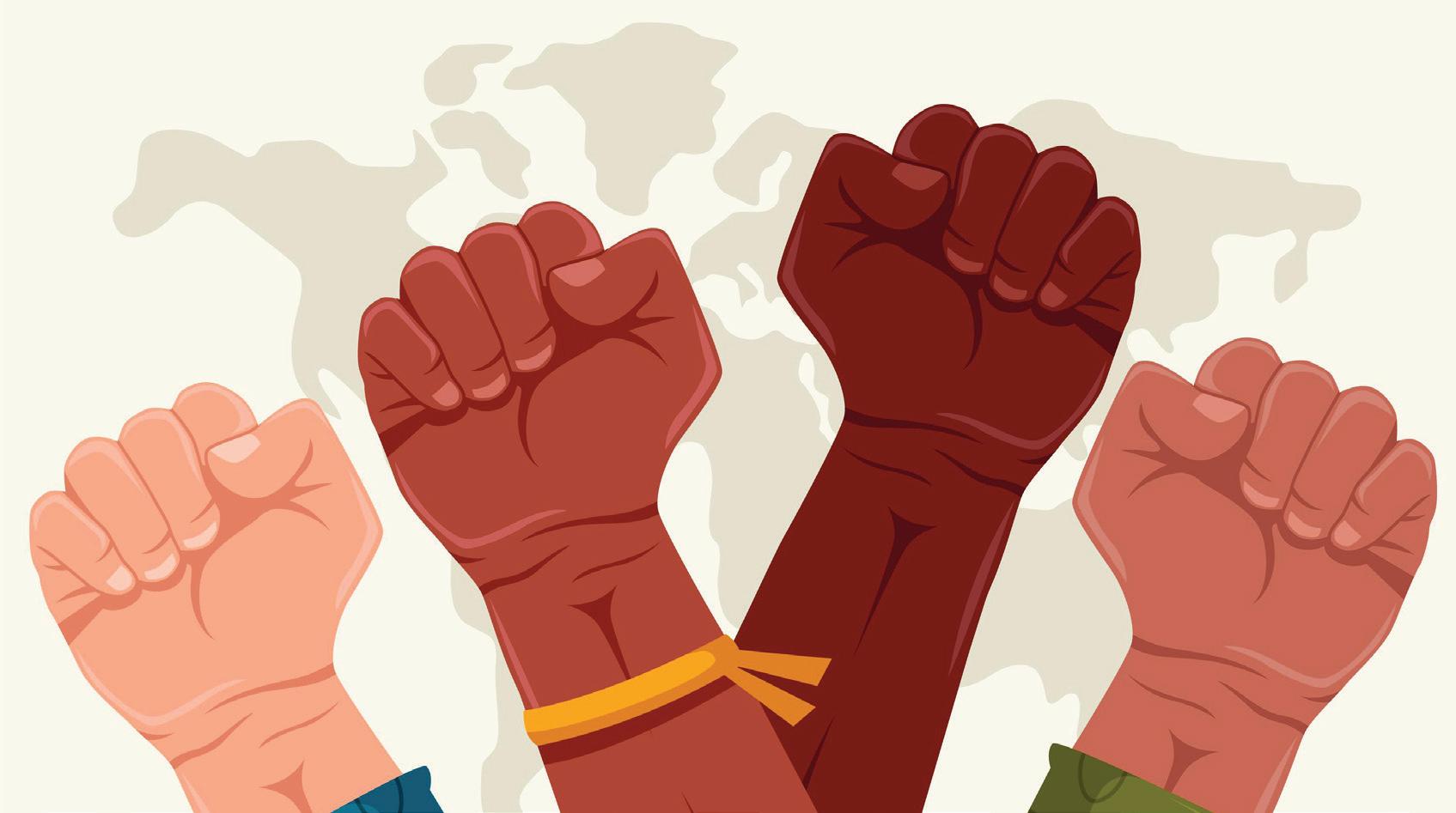
the people of South Africa. The Broad-based Black Economic Empowerment Act of 2003 aims to advance economic transformation and enhance the economic participation of black people in the South African economy.
The Preferential Procurement Policy Framework Act of 2000 provides guidelines that organs of the State need to follow when formulating and implementing their procurement policies.
The Labour Relations Act of 1995 transformed the workplace by ensuring that the rights of workers are respected and exercised within the law. Among other things, the Act regulates the organisational rights of trade unions, and promotes and facilitates collective bargaining in the workplace. It also deals
with strikes and lockouts, and the promotion of employee participation in decision-making through the establishment of workplace forums.
On the other hand, the National Economic, Development and Labour Council (Nedlac) Act of 1994 ensured the establishment of the Nedlac, a vehicle by which government, labour, business and community organisations seek to cooperate – through problem-solving and negotiation – on economic, labour and development issues, and related challenges facing the country.
While more still needs to be done, these laws have gone a long way in addressing inequality and other unjust factors in South Africa. Government continues to promote access to education, a right which is also
enshrined in our Constitution.
More people now have access to institutions of higher learning. Government has put in place various programmes that ensure that no one is left behind in accessing education.
Through the National Student Financial Aid Scheme, for example, government ensures that students from poor family backgrounds are able to study at tertiary institutions.
As we commemorate Human Rights Month, let us bear in mind that we are responsible for ensuring that government’s inclusive programmes that aim to deliver human rights are implemented.
As citizens, irrespective of race, gender, religion or sexual orientation, let us promote our hard-won rights and protect them from violation. ❖
Improving and protecting the health and well-being of South African students will go a long way to improving the country’s economic fortunes.
This is the firm belief held by the Higher Health (HH) chief executive officer (CEO), Prof Ramneek Ahluwalia.
In a recent interview with the Public Sector Manager (PSM) magazine, he reflected on the gains government has made in the sector as well as the road that lies ahead.
HH is a national agency that seeks to inspire the success of two million students at the country’s 26 universities, 50 technical and vocational training colleges (TVET) and nine community education and training colleges (CET). It seeks to reduce the effect of healthrelated conditions that often challenge students in tertiary studies and which have the potential to lead to students delaying the completion and even abandoning their studies. He accepted that while much
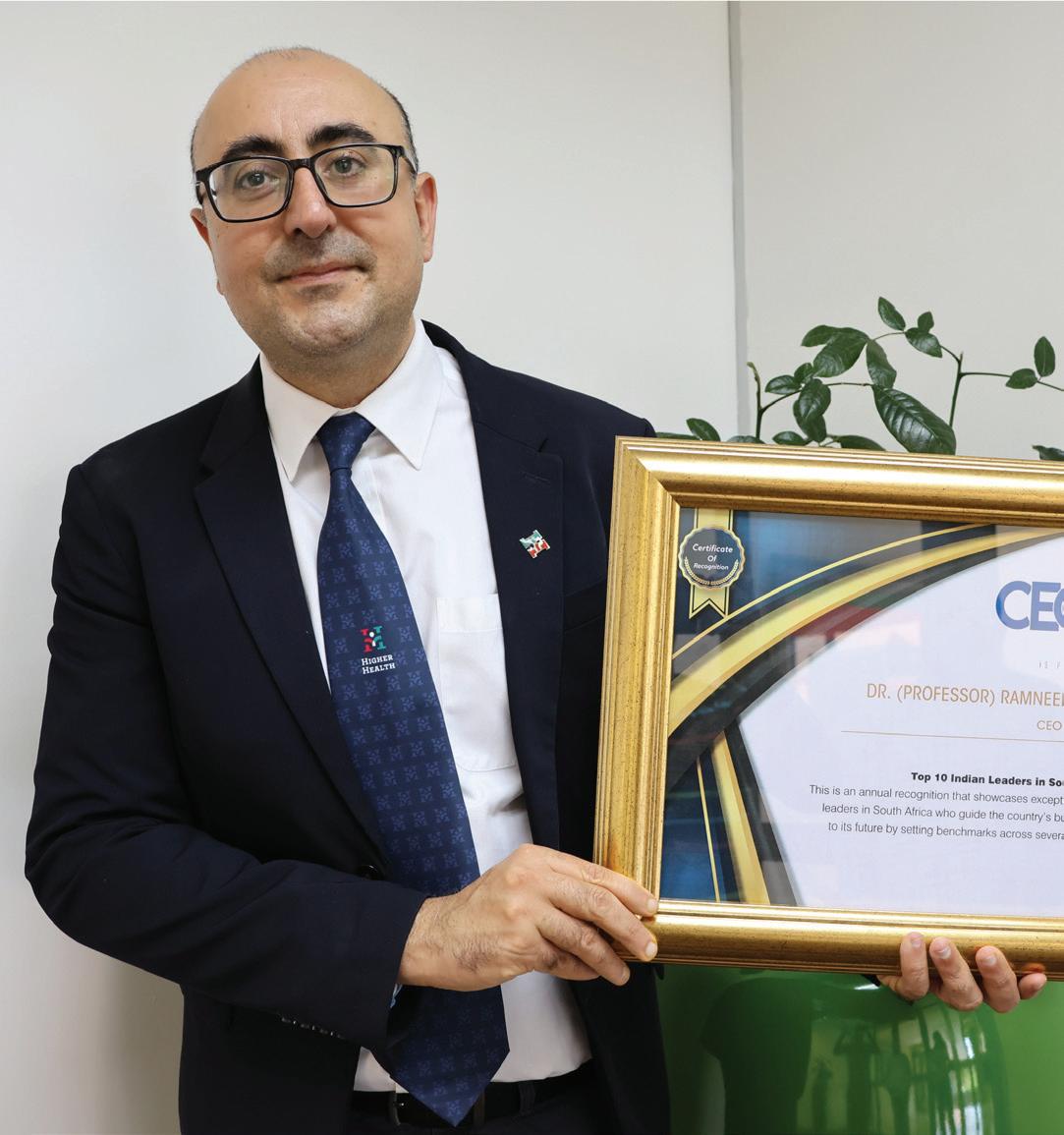
had been done to protect the various student groups, challenges remain.
“What is happening in the global world is also happening in our economy in South Africa. These are big challenges that impact any institution. We are not far away. If the global economy goes down, then our funds are reduced because we
get a lot of financial support from foreign donors, like the European Union and World Bank. These are big partners to Higher Health. They want to support the youth of this country,” explained Prof Ahluwalia. If growth doesn’t happen, he conceded, then targets could not be fulfilled. Contextualising this, he said it was important
for South Africa, a country with the median age of 27, to build resilience amongst its youth.
One of Higher Health’s most important programmes was that on gender-based violence and femicide (GBVF), aimed at curbing the scourge on South African campuses.
“Our department (Higher Education and Training) became the first ever government department in Africa to take the bold decision to put up an entire policy on GBVF. Yes, policy is just one word but it is pushing every institution through Higher Health to put investments and programmes to tackle this menace to society” he said.
To bolster its efforts, the agency in 2021 established the GBV Technical Task Team, chaired by the University of South Africa vice chancellor, Prof Puleng LenkaBula. It includes stakeholders such as the National Prosecuting
Authority, the Department of Justice and Constitutional Development, the South African Police Service, survivors, medical researchers, and student councils, among others.
“They come together and help us technically build the right procedural guidelines, minimum standards that each institution should follow religiously,” he said.
This includes how to prevent cases of GBVF on campuses, highlighting a journey of a survivor - from being sexually violated to reporting, accessing health and legal services, as well as statement of a complainant.
“The days are gone where we’d ask the victim (student) to go report cases at a police station. The question is: how do we bring in the police to work together in bringing justice for the individual,” he explained.
Similarly, Higher Health has a dedicated programme that focusses on the community needs of the lesbian, gay, bisexual, transgender, queer/ questioning, intersex, asexual and many other gender and sexual identities (LGBTIQIA+). The agency is understood to be the first institution on the continent to do a study on the
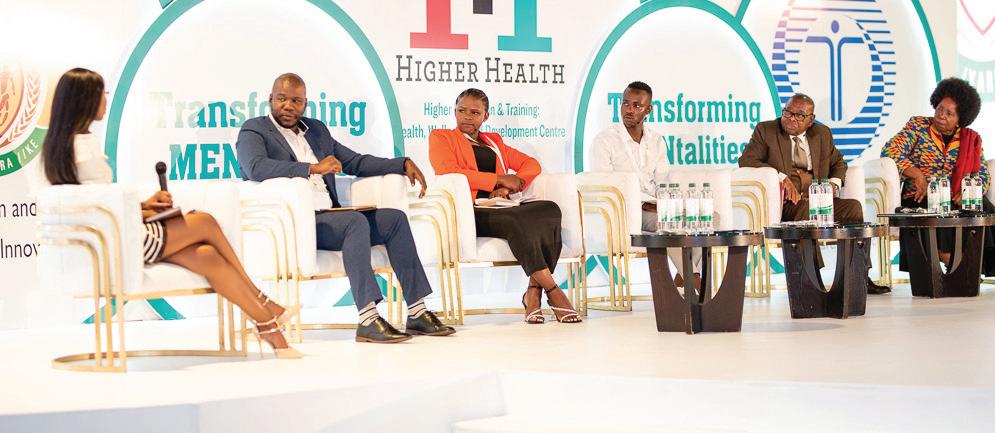
challenges and violations faced by the LGBTQIA+ community.
“Issues such as exposure to HIV, drugs and alcohol, and sexual abuse…We are tackling every issue. Our focus is around civic rights, and protecting this community's rights. While protecting these rights, the other concerns will be automatically resolved. That is what the whole programme is geared towards,” he added.
The agency, he said, also provides extensive programmes for people living with disabilities. In this regard, Higher Health had set an ambitious target of increasing higher education and the skills economy access to this vulnerable group.
“Secondly, the standardised reasonable accommodation should be applied in the lec -
ture venues, residences, and in the workplace.
“We are focused on individualised one-on-one services for students by students. Statistics South Africa (StatsSA) says 6% of our entire population lives with some form of disability. That’s a huge population that we need to protect,” the professor told PSM.
Key to HH’s future success is the initiation of the first ever global accredited qualification - through the Quality Council for Trades & Occupations - for every young person in South Africa.
The envisioned NQF 5 qualification will include modules on civic education on GBVF, equality, diversity, mental
health, climate change, drug and alcohol abuse, and building resilience, and HIV/sexual abuse. It will also cover soft skills of the workplace such as conflict management, empathy, leadership, and digital literacy.
“All will be taught within 300 notional hour,” he said.
Ahluwalia believes the agency has had a significant impact on the lives of students.
“Our programmes are student-centric and youth-friendly. We are growing because they believe in us. If you don’t have your client believing in you, nobody will. Even though we are a government entity, at the end of the day, students are our beneficiaries and anything we do needs to meet their expectations. If we do that, every institution will buy into it,” he concluded. ❖
You may argue that one is born a leader while others believe that leaders are created, but the Chief Executive Officer (CEO) of the Insurance Sector and Training Authority (INSETA) Gugu Mkhize says it takes a bit of both for one to be a leader.
When she joined the INSETA as CEO in 2020, Mkhize shared her vision of excellence with her team and they supported it from day one.
“Without excellence, it is almost impossible to realise transformation, and the team has

actually realised that over the past three years. We have a huge mandate of ensuring that we transform lives through skills development,” she said.
The organisation is one of the 21 Sector Education and Training Authorities (SETAs) in the country and it was established in 2000 to grow the pool and quality of critical and scarce skills within the insurance sector in South Africa. It is primarily responsible for skills development and training in the sector, ensuring that the
industry has a skilled workforce that is future-proof.
“Our mandate encompasses various responsibilities including the accreditation of training providers, funding of skills development initiatives, and promoting career development within the insurance industry.
“By fostering skills development and providing training opportunities within the insurance sector, INSETA supports the government’s broader efforts to enhance the country’s human capital, promote employment and stimulate economic productivity,” she explained.
As a leader, Mkhize loves waking up every morning to go to a healthy working environment, which she has created for the INSETA staff since she took the baton as CEO, she said. However, she firmly believes that it is important for her team members to hold each other accountable.
Through her leadership, her team is implementing the excellence model which challenges everyone in the organisation to always improve their work.
“I love working with people who are passionate and are like-minded so that we can continuously make a difference in people’s lives,” she said.
She is no stranger to the SETA
“It shows that we are making a meaningful contribution in the industry as well as the country. It is validation for the effort that we make towards meaningful impact in the industry, driving the transformation agenda, which is part of the overall goal of the country to ensure that there is transformation and that lives of citizens are being changed,” Gugu Mkhize.
environment and the public sector as she boasts over 20 years of work experience including holding key leadership positions such as being CEO of Excelle International, executive for corporate services at the National Home Builders Regulatory Council, executive manager for corporate services at Mining Qualifications Authority, senior manager for corporate services at the Johannesburg Social Housing Company, and senior corporate manager at the KwaZulu-Natal (KZN) Growth Fund Managers. She believes that education is one of the key contributors to a person’s development and growth.
Her decorated educational career includes a Bachelor of Arts Degree and Honours from the University of KZN, a Master’s
degree in Business Administration from Regent Business School, and she is currently studying towards a PhD in Digital Transformation.
She attributes her success to education, which has been her guiding principle all along.
“When you have education, you have got your foot on the door and it allows you to compete for any opportunity that is presented before you. I do not want to stop learning because education empowered me and it sets me apart from everyone else, and that is why I am torturing myself with a PhD at the moment,” she giggles.
The INSETA’s 20 years of existence coincides with South Africa’s celebration of 30 years
of freedom and democracy.
Mkhize believes that producing the skills that help to improve the industry ultimately contribute to the economic development of the country, and improve the lives of ordinary citizens.
“Over the past two decades, the INSETA has played a pivotal role in shaping and transforming the insurance industry by fostering inclusivity, empowerment and excellence,” she said.
She added that the INSETA has achieved a lot in the past 20 years through establishing and maintaining collaborations with the industry in order to enhance skills development and to produce the skills that are responsive to the industry needs.
“Most of the skills develop -

ment programmes that we facilitate are in partnership with the employers who are at the forefront of driving and implementing those programmes.
The INSETA’s programmes also benefit large, medium and small categories of employers, and we have to ensure that we align the skills demand with the skills supply,” she explained.
She added that its programmes also benefit the unemployed youth who are interested in pursuing careers in the insurance industry, it also facilitates training programmes for workers in the industry, and it supports businesses that offer insurance services in the country.
“About 92% of the businesses in our sector are small businesses and intermediaries who
benefit from the support and capacitation programmes that we provide including entrepreneurship, financial technology services and innovation.
“We facilitate skills development through funding learning programmes that speak to the needs of the insurance sector, including providing bursaries, learnerships and internships which are also linked to graduate development programmes,” Mkhize explained.
For her hard work and dedication, Mkhize was awarded Top Women Leader in Public Sector award in 2023.
She said the recognition was not just a personal achievement but also a testament to the hard work and dedication of her entire team.
“I am incredibly honoured and
humbled for this recognition. It’s a reflection of the collaborative effort we have put into advancing our organisation’s mission and serving our community.
“It shows that we are making a meaningful contribution in the industry as well as the country. It is validation for the effort that we make towards meaningful impact in the industry, driving the transformation agenda, which is part of the overall goal of the country to ensure that there is transformation and that lives of citizens are being changed,” she said.
Among the things she loves about her job, Mkhize is passionate about making a difference, driving innovation, building partnerships and being part of the successful stories of
individuals who have benefitted from INSETA’s programmes. Her message to public servants is that they should not only focus on what is being done but also the impact it has on society.
“Impact is our end goal because it guides how we deal with the communities that we serve,” she said.
She encourages everyone to continue on the journey of excellence, and sees herself as a leading example that government works, and that excellence works in the public sector because she has a huge job of contributing to the country’s value chain.
“We are the hope that we are looking for in terms of the change that we want to see as a country,” she said. ❖
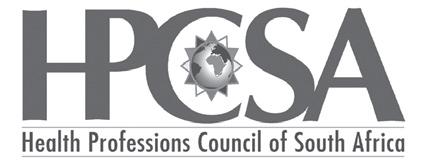
The Health Professions Council of South Africa (HPCSA) has embarked on a campaign to inform all health practitioners registered in terms of Health Professions Act No. 56 of 1974 (The Act) on matters relating to the Continuing Professional Development (CPD) programme.
CPD is the responsibility of every registered health practitioner. It is aimed at ensuring that the necessary skills and competency of practitioners constantly improve in the quest to ensure that the public is protected. There are benefits to health practitioners complying with CPD requirements, such as:
• Maintenance and enhancement of required professional skills and knowledge to ensure that practitioners continue to practice competently;
• Gaining insights into new approaches to practice;
• Improvement of health outcomes for patients and the general public.
Failure to comply with CPD requirements is a violation of the Act and may lead to penalties, such as suspension from practicing, being compelled to write a board examination, or other sanctions deemed suitable by the relevant professional boards.
Practitioners are advised to ensure that they are fully CPD-compliant as soon as possible. In terms of Section 18(3) of the Act, every registered practitioner who changes their contact details shall, in writing, notify the Registrar of the HPCSA within 30 days of such changes. This will assist the HPCSA in ensuring that communication from Council reaches the health practitioners.
To view your CPD status, update your contact details or perform any other self-service function, access the online services on the HPCSA website at www.hpcsa.co.za.
In the last 30 years since South Africa attained freedom and democracy, government has created a lot of opportunities for young people, including making education more accessible to all South Africans.
Senzo Ndlangamandla (35) is a true example of how access to quality education can change lives and help young South Africans achieve their dreams.
While in matric in 2006 at Sigqamise High School in Pongola, KwaZulu-Natal, his Accounting teacher made him fall in love with the subject, and he was inspired to pursue a career as an auditor through his teacher’s guidance.
Today, Ndlangamandla is a registered auditor and chartered accountant who works as the Head of Department for Accounting Sciences at the Walter Sisulu University (WSU) in the Eastern Cape..
“My key roles include providing academic and administration leadership in the department. I ensure that there are processes

in place to allow high quality offering of modules in the department and that our academic programme remains relevant to the industry,” he explained.
“I also have to ensure that the department is properly coordinated in order to achieve these objectives.
Overall, I am responsible for manag-

ing the staff within the accounting science department at the university,” he added.
Ndlangamandla’s journey began when he enrolled for a Bachelor of Accounting Degree at the University of Johannesburg in 2007. He then obtained an Honours Degree in Chartered Accountancy at the same institution in 2010.
He established his career as an academic trainee at the same university in 2011, and went on to become an audit trainee at Deloitte from 2012 to 2013. Afterwards, he joined the WSU as a Senior Lecturer in 2014. He was later appointed as the Head of the Audit Discipline at the same university.
While still at the university, Ndlangamandla served as the Johannesburg Stock Exchange Investment Challenge Coordinator in the Mthatha region, introducing students and learners (predominately from rural communities) to stock exchange dynamics.
He ascended to other leadership positions, including accounting sciences department manager and acting head of department, before he was permanently appointed as head of department, a job that he still occupies to date.
Since stepping into his current role, there are many initiatives that Ndlangamandla has successfully introduced and
formalised, not only those aimed at transforming the department’s approach to student support and development, but also aimed at supporting and developing the university staff.
In 2022, he introduced an initiative that improved the university’s South African Institute of Chartered Accountants (SAICA) ratings.
As part of this exercise, he set up a special task team comprising of senior academics from the department, WSU senior staff and some external experienced academics and educationalists from various universities.
To move with the times and ensure that their work is accessible on different platforms, he led the creation of the department’s Facebook page – becoming the only academic department within the university with an official and universityapproved presence on social media.
He recently played a leading role in organising an academic excellence awards ceremony to recognise students who excelled academically. The event, which will be hosted annually going forward, is meant to motivate students and create a culture of excellence among students.
“This event was a gamechanger, as other departments and faculties within the university were inspired and will most likely follow suit in 2024,” he said.
Because of his outstanding performance in the accounting and auditing professions, Ndlangamandla was announced as the overall winner of the 2023 Top 35-under-35 chartered accountants (CAs) competition.
The competition, which is run by the SAICA, recognises young South African CAs achievers who are not only excelling in their professional capacity but have demonstrated leadership potential and a commitment to ethical conduct, propelling the accounting profession to unimaginable heights.
Out of the more than 400 nominations for the competition, the SAICA had to select the top 35 from across the country, and he emerged the overall winner.
Ndlangamandla believes that there are no limits, and this is one of the philosophies that helped him achieve this milestone.
He recalls how, coming from a poor background, he had to work extra hard to be where he is.
“I had to put in extra work to try and improve my performance even in language proficiency and other aspects of my academic journey when I enrolled at university, and to now be recognised as a top chartered accountant under the age of 35 in the whole country is a big deal for me,” he said.
Although he acknowledged
that South Africa has achieved a lot in providing young people with varied educational and career opportunities since the advent of democracy, Ndlangamandla believes more can still be done to end the triple challenge of poverty, inequality and unemployment.
Ndlangamandla also urged public servants to continue fighting corruption.
“The unfortunate part about corruption is that it steals from the resources that are meant to change lives, create employment and curb poverty. It is a big pandemic that must be combatted,” he said.
He also emphasised the need for South Africans to vote in the upcoming elections.
“When you vote, you are directly deciding, but when you do not vote you are basically going with whoever everybody else is voting for. It is very important for everyone who is eligible to cast their vote,” he said.
Apart from his job at the university, he runs an audit practice called SnB Chartered Accountants and Auditors, a company that he founded with his friend in 2015.
It has a staff complement of 11, all youth, thus playing his part in addressing the all-time-high youth unemployment rate in South Africa. ❖
During the 2022/23 financial year, amid a sea of despair among the country’s stateowned enterprises (SOEs), the Industrial Development Corporation (IDC) stood as a beacon of hope.
When the year ended in March, 2024, the national development finance institution had an impressive story to tell.
A critical jigsaw puzzle piece of the parastatal’s executive management was its chief financial officer, Isaac Malevu.
This much became evident at the 2023 CFO Awards where he pipped two of his colleagues to the Public Sector CFO of the Year going. Also in the running in this category were his counterparts at the Department of Higher Education and Training and South African Forestry Company, in Pretty Makukule and D'Shorne Human.
“I was thrilled to be nominated and even more ecstatic to receive the award, especially considering the esteemed Public Sector CFOs who were also in
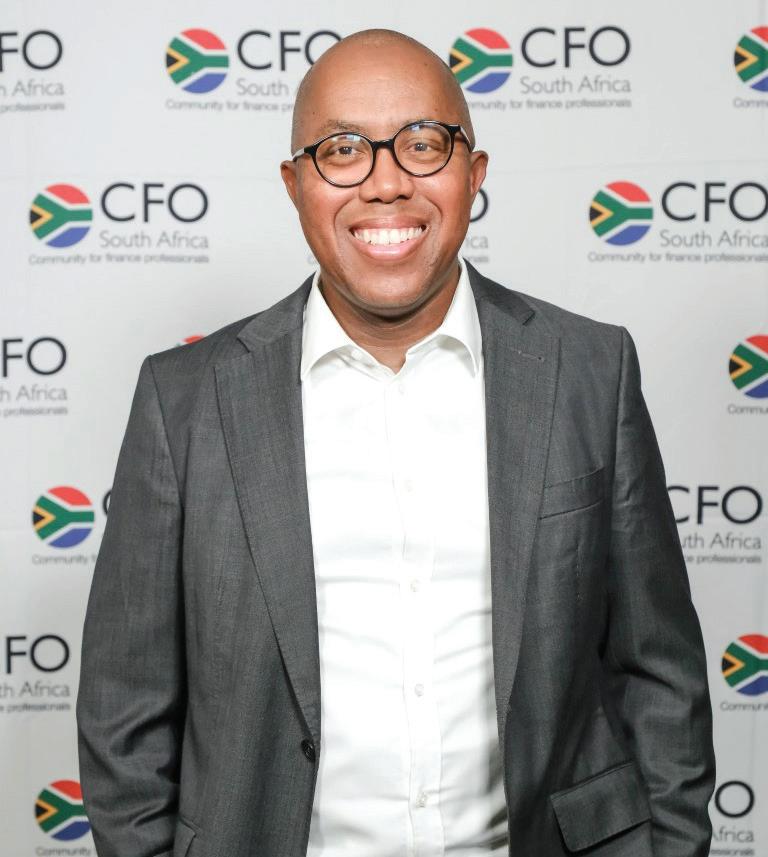
the running,” said Malevu in a recent interview with the Public Sector Manager (PSM) magazine.
His recognition was on the back of the corporation’s impressive showing in the 2022/23 financial year. It was during this period that the SOE’s funding
approvals reached a record R20.7 billion.
This was a 29% increase compared to the previous corresponding period. During that year under review, the entity’s disbursements surged by 147% to R17.8 billion from R7.2 billion recorded for the preceding year.
In its annual report, the IDC said the bulk of this funding was directed towards capacity expansions, projects and startups, in line with the Corporation’s mandate of facilitating South Africa's industrial capacity by financing viable businesses within key sectors to stimulate the country's economic growth.
The increased levels of investments have had a positive knock-on effect on the IDC’s developmental outcomes. For the year, the IDC created or saved 34 035 jobs compared to 27 130 for the 2021/22 reporting period.
Malevu said the impressive results could be attributed to the resilience of the entity’s investments, interest in dividends received from its listed portfolio and loan repayments. Beyond these, the performance could also be credited to the strict management of impairments, the strength and resilience of IDC staff and the sound project pipeline that the entity had generated over the last two years.
A chartered accountant by training, Malevu was a vital cog to the SOE’s achievement. He joined the IDC from Standard Bank’s Corporate and Investment Banking division in October 2020. Before this, the University of KwaZulu-Natal and Witwatersrand graduate was an audit partner at Ernest and Young. He boasts a wealth of experience
both locally and internationally having worked at the latter’s United States of America operation.
Reflecting on his transition from the private to the public sector, he said while professionals in the two spheres managers share the same financial management skills, these differed in scope.
He said: “Private managers focus on corporate financial management and wealth maximisation for defined stakeholders, while public managers deal with government finances and serve a larger stakeholder group.
“The IDC operates as a selffunding institution, like a bank we have criteria-based and riskinformed lending practices, and we collect repayments. Despite differences in stakeholders and policies, standard banking rules and financial management principles remain the same.”
On the award, he said the accolade acknowledges the excellent work done by his colleagues and himself in managing the IDC’s finance portfolio over the past three years. The period was characterised by mammoth challenges that required the IDC to intervene significantly. These ranged from the COVID-19 pandemic, the 2021 civil unrest, and the KwaZulu-Natal floods.
“Despite these challenges, our team of committed finan-
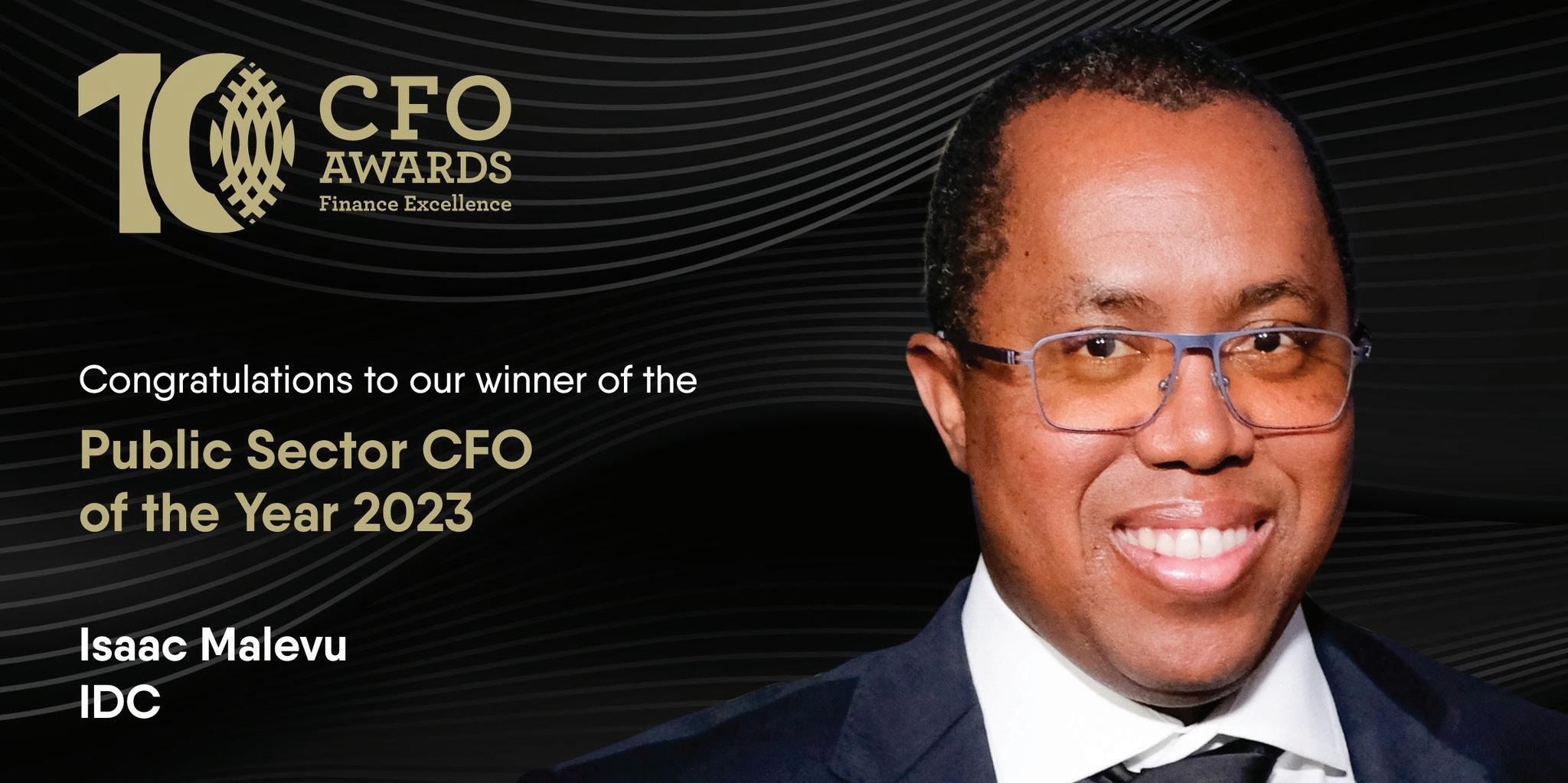
cial managers turned our R7 billion operating loss into an impressive R6 billion profit. I am honoured to lead such a team that is dedicated to driving IDC towards financial sustainability and delivering on its mandate,” he reflected.
Professional achievements and recognition, he elaborated, were just the visible part of the hard work and dedication that goes into creating a collaborative and team-oriented work environment.
“At the IDC, we have successfully fostered such an environment, and it is a source of immense pride for me. This positive workplace culture has not only contributed to our recognition as a leading financial institution but also ensured that we remain an example in public sector fiscal management,” he explained.
The interventions saw the IDC buck the trend of the struggling SOEs amid a myriad of chal-
lenges that stymie performance. Government entities on, an ad hoc basis, have to contend with issues that range from slow economic growth, geopolitical tensions, domestic power supply constraints and weather-induced natural disasters.
Expanding, Malevu said: “Our struggling economy has created challenging conditions for businesses and IDC clients alike. Rising production costs and consumer prices, coupled with reduced economic activity, have led to a decrease in production and export volumes, as well as a decrease in household spending. This has also deterred fixed investment activity.”
Despite these challenges, he added, the IDC’s financial performance has remained consistent over the past few years. He said this was testament to the hard work and dedication of IDC employees, who had worked
tirelessly to generate revenue and support struggling clients to turn their performance around and increase their ability to repay loans.
“Additionally, our focus on reducing costs and minimizing impairments has contributed to our excellent performance last year,” he said.
He added that for the IDC to continue contribute to the growth of South Africa's economy and society, the corporation needed to remain financially sustainable.
In this regard, he said the IDC remained fully committed to ensuring that it not only fulfills its purpose as a development funding institution but also supports viable businesses that create employment opportunities.
“Our aim is to be fit for both purposes and to make a positive impact on our mandate,” he concluded. ❖
Several important milestones have been reached as part of the work underway to reform and professionalise the Public Service. These developments are vital both to advancing the goal of a capable developmental state and giving effect to recommendations of the State Capture Commission.
The National Assembly recently passed two important pieces of legislation that will improve the functioning of the Public Service, strengthen accountability and increase efficiency. These bills – the Public Administration Management Amendment Bill and the Public Service Amendment Bill – will now go to the National Council of Provinces for consideration.
The Department of Public Service and Administration has also published a new directive to guide departments in implementing the Framework for the Professionalisation of the Public Service.
This directive, together with the draft legislation, will have
a far-reaching impact on the functioning of the Public Service. They give effect to some of our most important tasks.
Firstly, these reforms will help ensure that the best people are appointed to the Public Service and that they are given support to perform effectively.
The directive, for example, requires that a person can only qualify to be appointed to senior management in the Public Service if they have successfully completed the pre-entry programme known as Nyukela. The course, which is provided by the National School of Government (NSG) and takes about 120 hours to complete, aims to ensure that all applicants to senior management have the knowledge and capabilities they need to succeed. The course aims to ensure that prospective senior managers are grounded in the values of good citizenship, ethical leadership and developmental public administration.
All shortlisted candidates must undertake two pre-entry assess-

ments – a practical exercise that tests their competencies, and an integrity assessment that establishes their grasp of ethical principles and ability to take ethical decisions.
All new employees must undergo a compulsory induction programme within six months of appointment, and all current public servants must attend a compulsory re-orientation programme once every five years.
To ensure continuous learning and development throughout a public servant’s career, every department must spend at least 1% of their wage bill on training.
To support this effort, the draft legislation currently in Parliament establishes the NSG as a national department to provide education and training to employees in all spheres of government, including municipalities and public entities.
During the State of the Nation Address last year, I announced that the NSG will work with the Human Sciences Research Council to undertake a skills audit in selected infrastructure and frontline services departments.
The first phase of the project has now been completed, giving us valuable insights into potential critical skills gaps in these departments. In infrastructure departments, for example, the report highlighted the need to improve knowledge of modern engineering practices, sustainable construction methods and environmental impact assessment. The results from the frontline services departments will support the work being done to improve the administration of public services and the quality
of services provided. These skills audits have been well received and will help us to get the best that each public servant can offer.
Another important part of the most recent directive, is that the requirement of work experience has been waived for entry level posts in the Public Service. This must be accompanied by in-service training and support such as coaching and mentoring. Departments are also instructed to establish graduate recruitment schemes to attract young people leaving higher education institutions into the Public Service.
Secondly, the reforms contained in the draft legislation will significantly reduce the potential for undue political interference in the administration of government.
The Public Service Amendment Bill makes a clear distinction between the powers of elected officials, such as Ministers, and professional public servants, such as directors-general (DGs) or heads of department. The elected officials, legally defined as the Executive Authority, provides strategic and political direction, while heads of department are granted full administrative powers to run their departments.
This clear delineation of powers will make for a more professional and efficient public service. It will also help to pre -
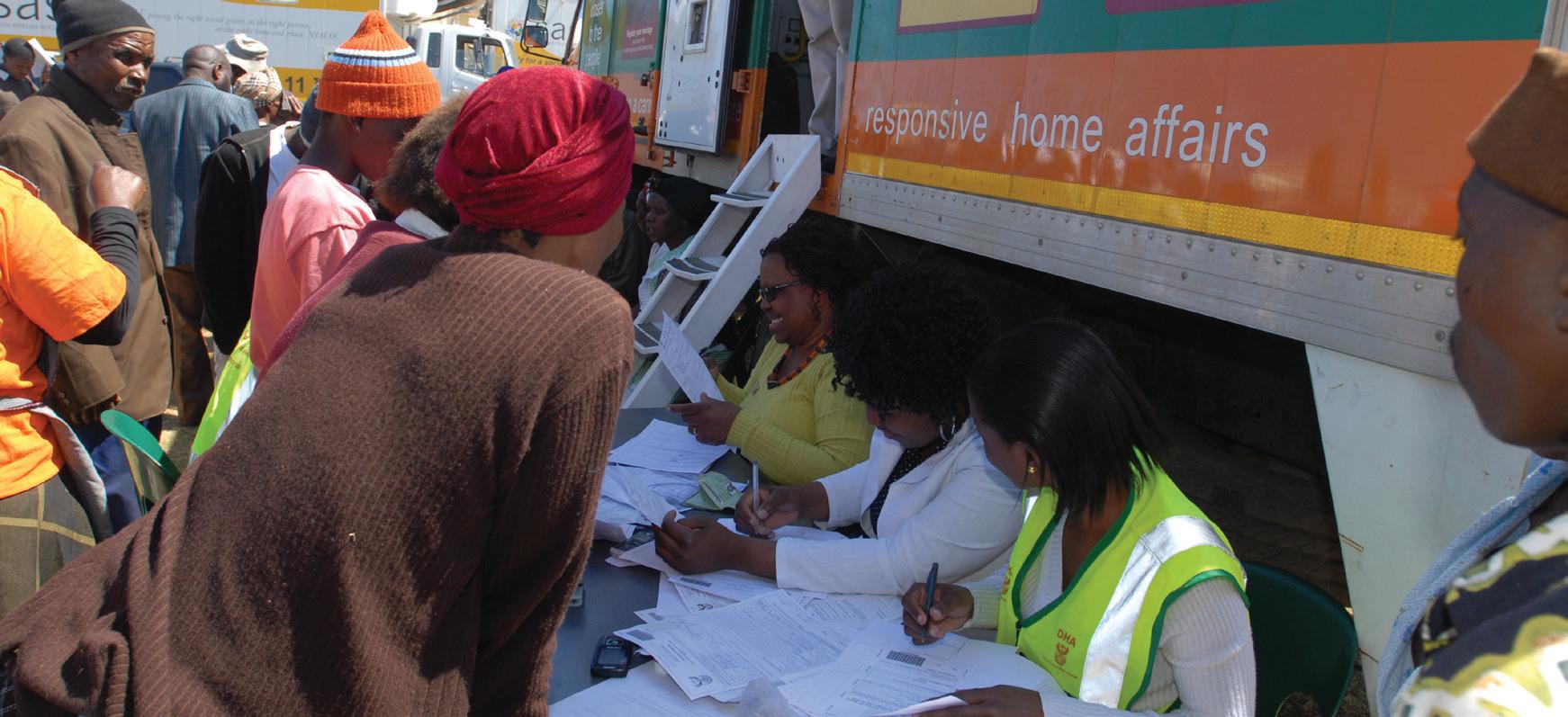
vent the kind of undue political interference in the administration of the State that the State Capture Commission found sometimes enabled corruption.
Another important change proposed in the legislation is to prohibit a head of department or an employee directly reporting to them from holding political office. This is to strengthen the distinction between political and administrative roles.
Thirdly, these reforms will improve coordination and accountability.
Among other things, the draft legislation will enable the transfer of public servants between national and provincial governments and municipalities. This will help to ensure that people with technical and scarce skills and capabilities can be moved to where they will have the greatest impact. This is particularly important for supporting municipalities, which often
suffer from a shortage of skilled employees.
The draft legislation also assigns additional functions to the DG in The Presidency, in line with the National Development Plan, to create an administrative head of the Public Service to whom DGs would report on operational, organisational and administrative matters.
Fourthly, these reforms will strengthen the fight against corruption.
As part of the draft legislation, public servants who leave government may not, within 12 months of leaving, accept employment or appointment to the board of a service provider to which they were involved in awarding a contract. They may not perform any paid work or receive any other payment. Service providers or employees who contravene this provision would have committed a crime and could be fined up to R1 million.
To improve accountability and tackle corruption, an inter-departmental task team has developed a central register to track all dismissals and resignations with disciplinary cases pending in national and provincial government. This register currently has over 12 000 records. Work is underway to include information from local government and public entities. This will prevent public servants with disciplinary records being appointed in another part of the State.
All of these reforms will contribute to building a more effective and efficient state that is responsive and accountability. They will enable public servants to do their work without interference and with the necessary support. And they will provide impetus to our collective efforts to build a capable state that is better equipped to fundamentally transform and develop our society. ❖
Over the past two decades, South Africa's democratic local government system has indeed ushered in an era of unprecedented developmental excellence, marking significant progress in advancing human rights at the grassroots level. As the foundation of democratic governance, local government continues to play an important role in promoting and protecting human rights within communities, and the past 30 years of democracy in South Africa provide a compelling narrative of this intersection.
In this month of celebrating Human Rights, we reflect on this journey that is marked by a resolute commitment to inclusivity, the implementation of progressive policies, and the enactment
of legislation that has left an indelible mark on the nation.
The transformative impact of the local government system is not just a theoretical concept; it is a tangible reality, evident in the positive changes and advancements witnessed across the entire country.
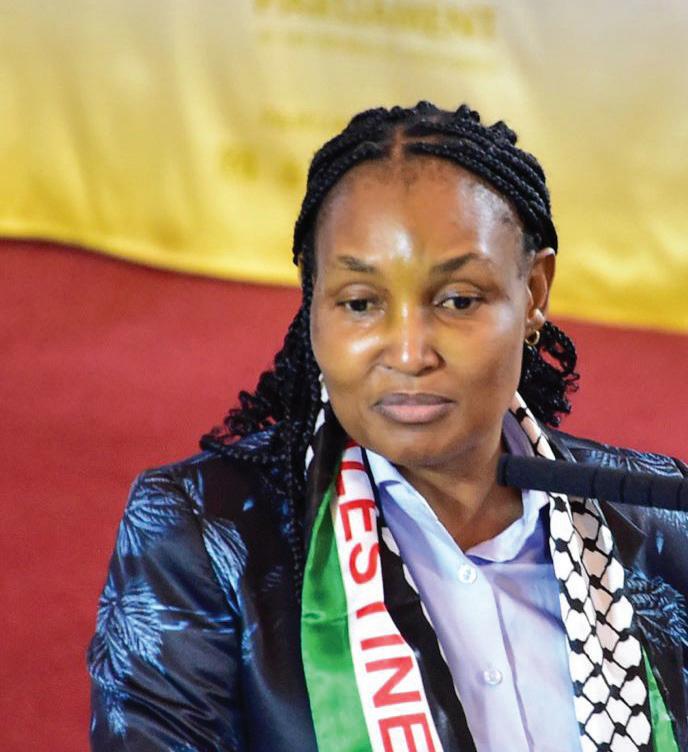
mental services have become a reality for countless families, marking a substantial improvement in their quality of life.
One of the most significant triumphs of this democratic local government is the improvement in the lives of millions of households that were once deprived of essential services. Through the tireless efforts of our democratic local government, basic amenities that were once out of reach for many now stand as symbols of progress and prosperity. Access to clean water, sanitation, electricity, and other funda-
Crucially, the normalisation of regular free and fair elections has emerged as a cornerstone of our democratic ethos. This democratic exercise not only reflects the core principles of equality and representation but has also played a role in fostering racial and gender inclusivity within municipal councils. The composition of these councils brings us closer to mirror the diversity of our nation, ensuring that the voices of all citizens are heard and considered in the decision-making processes that directly impact their lives.
Acknowledging our undeniable
successes, it is crucial to confront the persisting challenges— chief among them, the battle against dysfunctional municipalities, economic disparities, and declining service quality as well as backlogs in some areas. The recent challenges posed by the COVID-19 pandemic, failing power systems and the effects of climate change, have only served to amplify these difficulties. However, within the adversities, a beacon of hope shines brightly.
A comprehensive 21-year review, conducted by the Department of Cooperative Governance (DCOG), now unveils a roadmap for progress. This thorough examination not only recognises the challenges
but also shifts the focus towards concrete solutions and strategies to fortify a more resilient and responsive local government system.
Municipalities, often the unsung heroes, play an important role in providing essential services and shaping the built environment. Astonishingly, municipal infrastructure spending surpasses that of national and provincial governments combined, excluding State Owned Entities (SOEs). This stands as a testament to their dedication to directly benefit households and address the unique needs of diverse communities.
However, the review brings attention to a concerning trend of declining municipal investment post-2016, exacerbated by the impacts of the COVID-19 pandemic and the impact of climate change. Despite these challenges, it underscores the positive strides made in providing water services, with 88.7% of households having access to piped water in 2021, an increase of 5.3 million households compared to 2002.
Sanitation services have seen a notable increase, with 84.1% of households having access in 2021. Particularly noteworthy is the Eastern Cape's impressive 59.3 percentage point increase, reaching 92.7% access. Elec -
trification efforts have borne fruit, with 89.3% of households connected to the mains electricity supply in 2021. Surprisingly, rural areas, including Limpopo, Northern Cape, and Free State, lead in electricity access, challenging preconceived notions. While solid waste management has made progress, with a slight decline in weekly removal services, the review indicates that over 80.6% of metropolitan households do not separate waste for recycling. This highlights the imperative need for increased environmental awareness and education.
The commitment to uplifting the less privileged is evident in the Free Basic Services (FBS) programme for indigent households. Ensuring a minimum package of tariff-free essential services, this initiative reflects the government's dedication to supporting those in need.
In 2019, in a bid to enhance the integrated delivery of services and ensure a more efficient, accountable, and people-centric local governance system, Cabinet approved the District Development Model (DDM). This operational model is set to transform cooperative governance, fostering a capable and ethical Developmental State while elevating the state of local government.
The DDM operates on the principles of an all-of-government and society approach, facilitating collaboration among all three spheres of government and state entities. This holistic strategy aims to promote higher performance, accountability, and effective service delivery with a focus on impactful development outcomes.
The DDM reinforces the need for improved intergovernmental coordination within the existing intergovernmental relations system. Moving away from mere alignment of plans, it advocates for co-planning, co-budgeting, and co-implementation of key developmental objectives and priorities. Importantly, the DDM does not replace the existing division and allocation of powers, functions, and responsibilities of spheres of government and organs of state.
While proactive measures like the DDM aim to strengthen local governance, Section 139 of the Constitution provides a mechanism for provincial and national interventions in municipalities when they fail to meet executive obligations. Since 1998, there have been 161 invocations of Section 139 interventions in municipalities, with an average of seven interventions per year. The majority of interventions since 2016, involving over 65
municipalities, were prompted by financial and governance issues. Common challenges leading to interventions include lack of service delivery, financial mismanagement, poor governance, political and administrative instability, and failure to meet financial obligations. Financial non-viability often stems from issues such as poor budgeting, weak billing systems, infrastructure mismanagement, and fraud and corruption, emphasizing the importance of effective financial management in local governance.
The introduction of the DDM and ongoing interventions under Section 139 signal our commitment to creating a resilient, accountable, and service-oriented local governance system. Through these initiatives, South Africa is forging a path towards a future where every municipality can thrive, delivering essential services efficiently and fostering community well-being.
As South Africa navigates its developmental journey, the 21-year review provides not just a reflection of challenges but a roadmap for a brighter, more inclusive future. By addressing current issues, building on successes, and nurturing collaboration, the nation can continue on its path towards a resilient and prosperous future for all. ❖
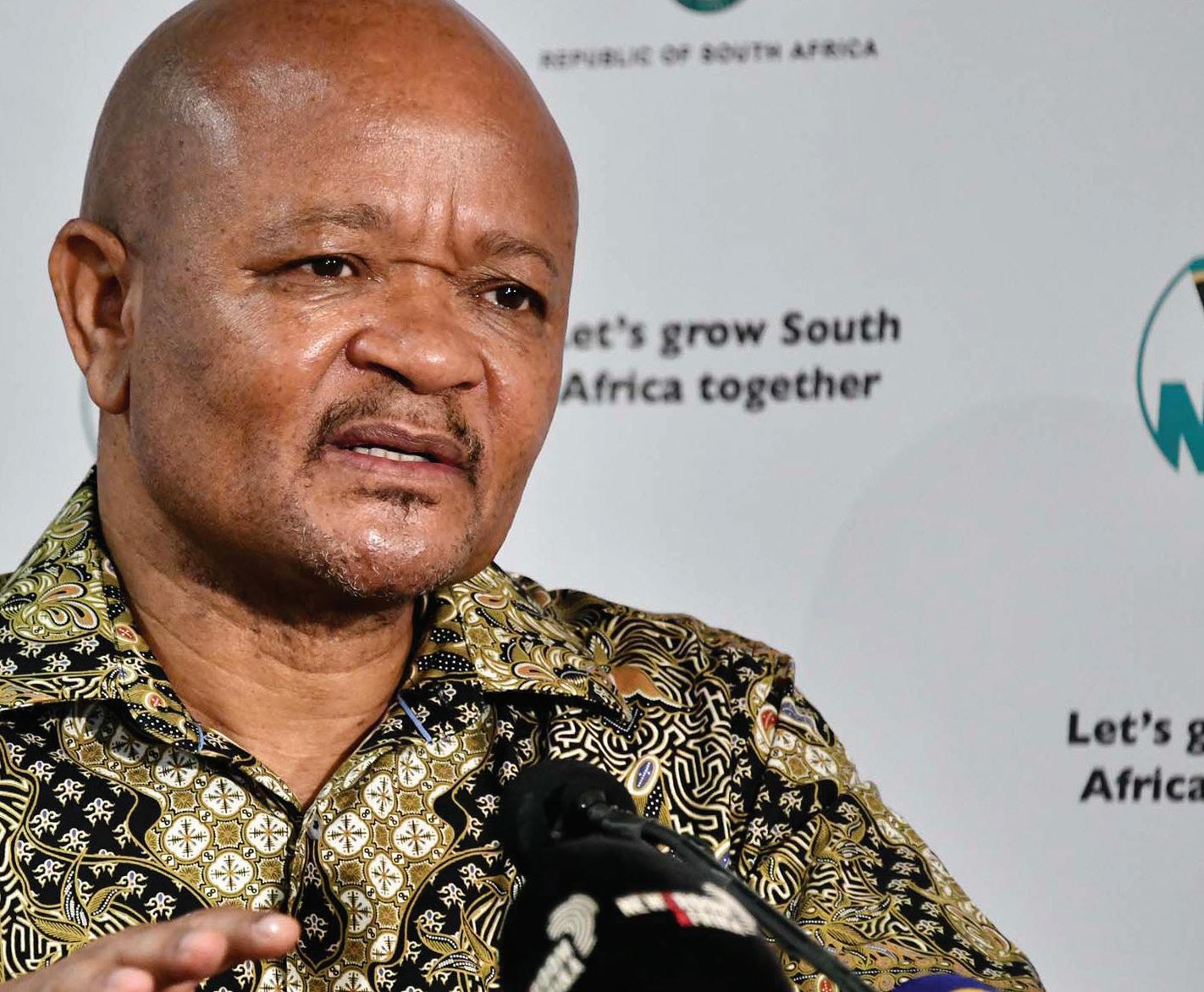
Minister of Water and Sanitation Senzo
Mchunu says the nonprovision of clean drinking water and a clean environment goes against people's basic human rights, as outlined in the Bill of
Rights in the Constitution of the Republic.
According to South Africa’s Constitution, the primary role of municipalities Water Service Authorities (WSAs) is to ensure the delivery of water services,
not necessarily to deliver the services themselves.
In terms of the Water Services Act read together with the Municipal Systems Act (MSA), a Water Services Authority must decide whether to deliver water
services itself, or to approve another Water Services Provider to provide the services.
During the two-day Water Services Authorities Summit that was recently held by the Department of Water and
Sanitation (DWS) in Kempton Park in Gauteng, Minister Mchunu called on the water sector to set aside egos and prioritise providing adequate water and sanitation services to the public.
“The provision of reliable quality drinking water to citizens must be treated with priority and necessary urgency. The decline in water quality and increase in water losses [are] pressing issues that demand immediate attention,” said Minister Mchunu.
The summit was held in response to the outcome of the water quality (Blue Drop) and non-revenue water (No Drop) Reports, and the state of waste (Green Drop) Progress Assessment Report released in December 2023.
The Blue and No Drop Reports indicate that there has been a decline in drinking water quality and an increase in non-revenue water since the last reports were issued in 2014.
The Green Drop Progress Assessment Report also indicates an increased risk in the performance of municipal wastewater treatment systems.
The Blue Drop report found that percentage of water sup -
ply systems with poor or bad microbiological water quality compliance (water that is not safe to drink) increased from 5% in 2014 to 46% in 2023.
The No Drop report found that the national average for municipal non-revenue water increased from 37% in 2014 to 47% in 2023.
The Green Drop report found that the percentage of municipal wastewater systems in a critical state of performance (i.e. discharging partially treated or untreated sewage into rivers) increased from 30% in 2013 to 39% in 2022.
“These issues have caused great concern among the public, particularly regarding the growing percentage of drinking water systems failing to meet both national and international compliance standards as revealed by these assessments,” the Minister said.
Therefore, he deemed it imperative that the water sector takes immediate action to address these challenges.
The summit enabled the DWS, COGTA and the WSAs to agree on what should be done to address the findings of the drop reports.
It also reviewed the progress
assessment reports, determined the underlying reasons for poor and good performance, and collectively developed a plan to reverse the decline in performance.
Also, in attendance was the COGTA Minister Thembi Nkadimeng, DWS Deputy Ministers David Mahlobo and Judith Tshabalala, as well as provincial and local government representatives including Mayors, Members of the Mayoral Committees, Municipal Managers and technical officials of the 144 WSAs across the country.
Representatives from various institutions including the water boards, the Municipal Infrastructure Support Agency, National and Provincial Treasury, professional bodies, and training organisations were also in attendance.
Attendees developed joint action plans to improve the quality of municipal drinking water, and optimise wastewater management as well as water conservation and demand management.
Minister Mchunu highlighted that the Drop certifications were initially introduced 16 years ago in 2008, with annual reports being released from
2009 until 2014.
These reports served as an effective regulatory mechanism, evaluating water and sanitation services, incentivising municipalities to improve their performance, and guiding areas for enhancement.
“We have resuscitated the assessments and are committed to preventing similar mistakes in the future,” Minister Mchunu said.
During discussions, municipalities were categorised into four groups based on their Drop scores during discussions on how to improve.
The first group comprised 67 municipalities that have an average ‘critical’ score in their water supply and/or wastewater systems in the 2022 and 2023 Green Drop.
The second group comprised 38 municipalities that had an average ‘poor’ score in their water supply and/or wastewater systems in the 2022 and 2023 Green Drop.
The third group included 27 municipalities that have an average 'average' score in their water supply and/or wastewater systems in the 2023 Blue Drop and 2022 Green Drop.
Lastly, the fourth group
comprised 12 municipalities that have an average 'good' or 'excellent' score in their water supply and/or wastewater systems in the 2023 Blue Drop and 2022 Green Drop.
“The 105 municipalities who are in the critical, poor and average categories were urged to utilise consider appointing reputable, credible, and competent water service providers for the next two to three years,” the department said.
Following the discussions, several recommendations were made to improve the water sector and enhance water and sanitation services for the public.
The summit agreed that
WSAs should make fundamental changes on the delivery of water and sanitation services, by either considering establishing their own entities or creating special-purpose vehicles as water service providers.
Deputy Minister Mahlobo said it is key to strengthen the budget for water and sanitation services.
“This will include relooking at budget allocation to ensure that more funds are allocated towards provision of these services to the public. Infrastructure security is also important to ensure uninterrupted water services,” the Deputy Minister emphasised.
He urged all municipalities to develop and execute reliable infrastructure security plans,
which should include the use of technology such as remote fencing and a rapid response system to combat theft and vandalism of infrastructure.
“These measures will not only protect the vital water infrastructure but also ensure a reliable supply of water to the public,” he said.
He also announced the formation of a multi-disciplinary security cluster consisting of Ministers and Mayors.
The cluster will be responsible for leading intelligence operations and prosecutions against elements that hinder service delivery such as vandals, mafia as well as saboteurs of water infrastructure.
As part of the plan to improve service delivery, the depart-
ment said Directors-General of the DWS, COGTA, South African Local Government Association, and the provincial and local governments will collaborate to strengthen the capacity of implementing agents.
“This will ensure that the water sector will be better equipped to deliver on its mandate and meet the needs of the public,” the department said.
By implementing the recommendations put forward, Minister Mchunu said the water sector can make significant strides towards meeting the needs and rights of the public.
He said although the challenges are great, with a unified effort and a commitment to collaboration, a positive change is indeed possible. ❖
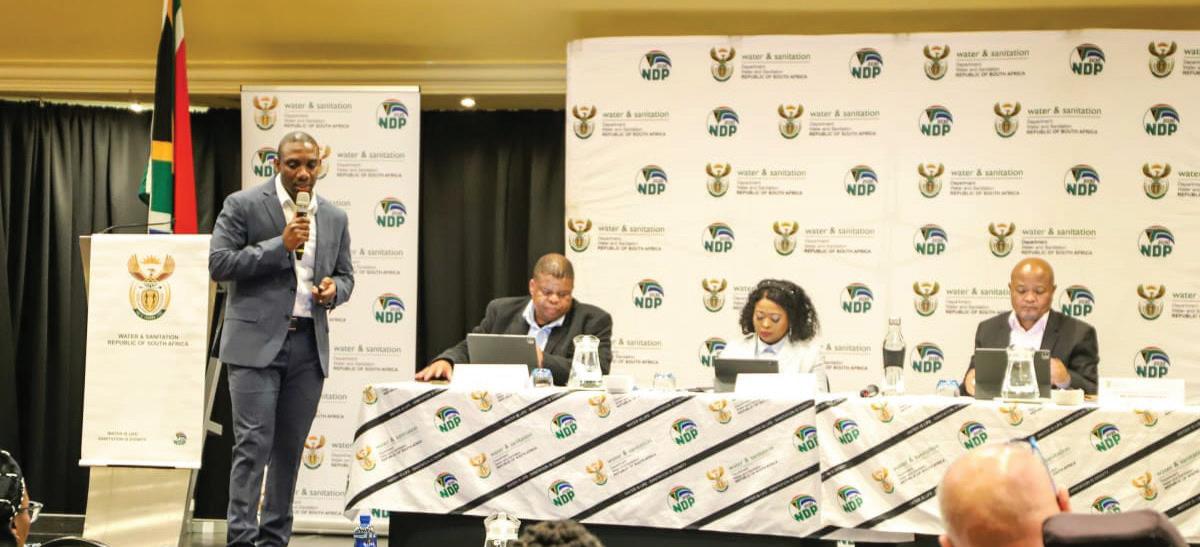




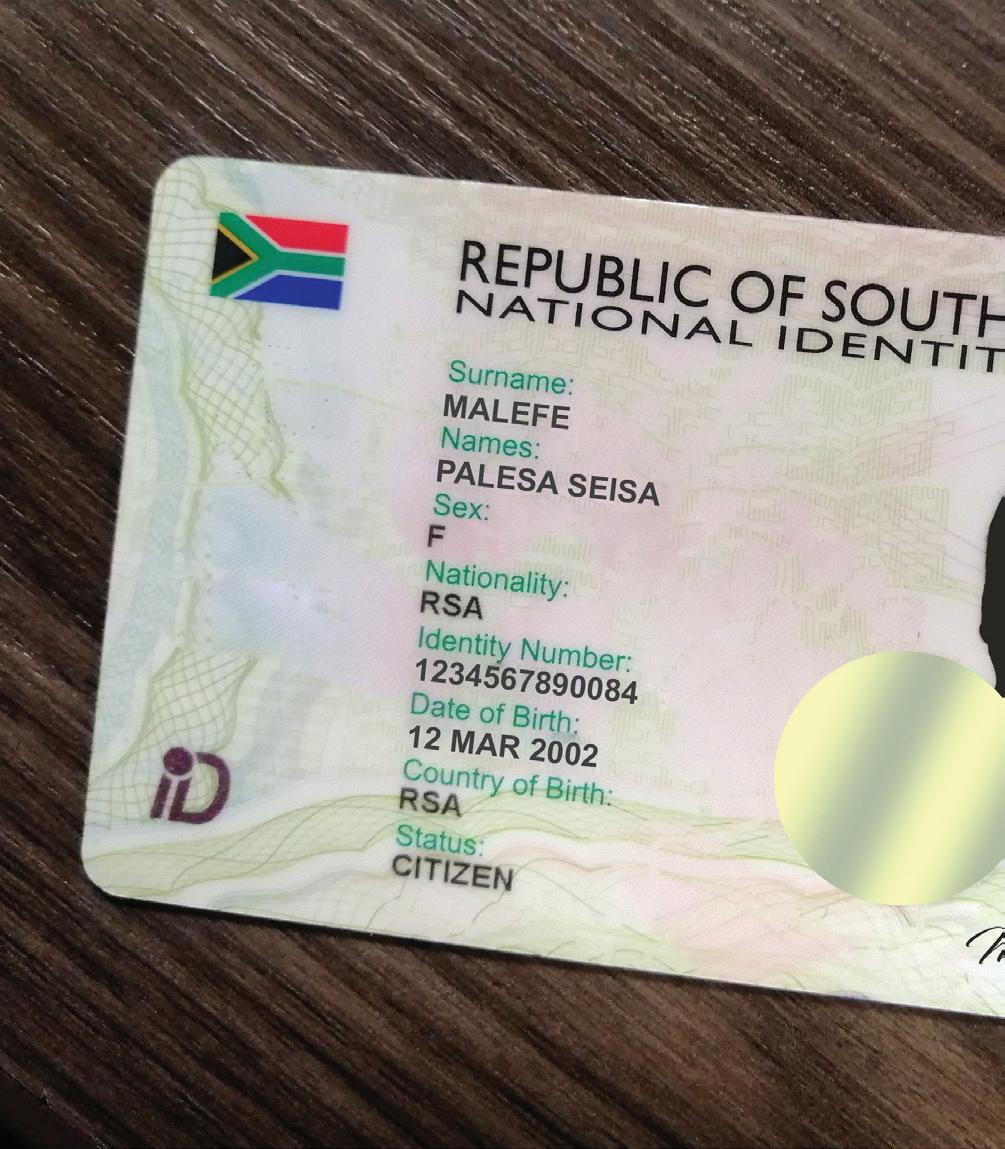
Source: Dr Masindi Mapholi, Department of Water and Sanitation: Water Services Planning Support (WSPS) Image : Supplied (Dr Masindi Mapholi). Freepik (Water Tank)
Water Services Development Planning (WSDP) is a process to enhance the understanding of the water and sanitation business.
This plan deals with long-term planning for the provision of water supply and sanitation services by water services authorities (WSAs), addressing socioeconomic, technical, financial, management and environmental aspects. It is also used as a basis for regulating water services authorities.
The Water Services Act 108 of 1997 emphasises that, “The main
objects of this Act are to provide for:
(a) the right of access to basic water supply and the right to basic sanitation necessary to secure sufficient water and an environment not harmful to human health or well-being.”
The act provides a mandate for all WSAs to develop water service development plans and
adopt them as their 5-year cycle plan to provide water and sanitation services within their municipal boundaries. South Africa has 144 WSAs.
All WSAs must integrate the plan into their integrated development plans (IDPs). Municipalities that are authorised to render water services provision must
draft the plan as part of their IDP process, elicit comments on it, consider and report consideration of comments, finalise and adopt the plan, and supply copies to the Department of Water and Sanitation (DWS), Department of Cooperative Governance and Traditional Affairs (CoGTA) and neighbour-

ing WSAs. WSAs should report on the implementation of the WSDP on an annual basis.
Over and above this, Section 26 of the Constitution 108 of 1996 emphasises that no legislation may permit arbitrary evictions. Section 27(1)(b) also states that “Everyone has the right to have access to sufficient food and water.”
In 2012, the Department of Water and Sanitation evaluated the impact of its WSDP Support Programmes and found that ownership of the WSDP processes in local government is lacking.
Most municipalities were unable to provide water and sanitation services due to the lack of water services development plans and adequately skilled, qualified staff.
The department established a water service planning maturity matrix to evaluate the compliance of local government with the water services planning requirements as outlined in the Water Services Act of 1997.
A WSDP online system was established as an administrative tool, and capacity building has been conducted as part of an
ongoing programme with all 144 WSAs.
The department has instituted several processes and programmes to provide water services planning guidance and support to the sector, including the establishment of WSDP guidelines, frameworks and procedure manuals directly supporting WSAs and providing guidelines and formats for IDP integration with WSDPs.
The WSDP online system is ac cessible to officials of the WSAs, non-governmental organisations (NGOs), private services provid ers (PSP), community members and water users associations (WUA) at https://ws.dws.gov.za/ wsdp/default.aspx. It will provide data and planning information for any municipality of their choice.
The online system or template provides a status quo overview of water business elements such as demographics of the munici pality, water service levels, water services infrastructure man agement operation and main tenance, associated services, water balance, water resources, conservation and demand management, water services institutional arrangements and customer service requirements.
It is the obligation of the WSA or municipalities to ensure that they populate the system with quality and accurate data and planning information so that their WSDPs provide accurate information that can be used and applied with confidence.
The system is hosted on the DWS website as part of a national integrated system covering all WSAs in South Africa
interactive planning activities captured in the comprehensive database structure embedded in the online system. The WSDP System allows for easy updating by the WSA through access security allocations guided by the login registration process. ❖
This article is extracted and elaborated from Dr Masindi Mapholi's thesis, “Facilitating an integrated water

The World Health Organisation says Tuberculosis (TB) is still one of the world’s deadliest diseases and recent years have seen a worrying increase in incidences of drugresistant TB.
As South Africa joins the world to commemorate World TB Day on 24 March, Public Sector Manager magazine spoke to the chief director for TB control and management at the National Department of Health, Professor Norbert Ndjeka. He is also an Honorary Associate Professor of Medicine at the University of Cape Town.
World TB Day is an opportunity to renew commitment, inspire and take action to end TB.
As South Africa (SA) celebrates 30 years of freedom and democracy this year, Ndjeka reflects on the challenges and successes that the country has had in the past 30 years, with a focus on the past three years.
He said the past three years have been crucial in the fight against tuberculosis globally and particularly in South Africa.
“South Africa is [currently] number nine among the 30 countries that have the highest burden of Tuberculosis (TB)
globally, accounting for 87% of global TB statistics. The Brazil, Russia, India, China and South Africa (BRICS) countries have 38% of global TB burden,” he said.
“All BRICS countries have lower TB incidence rates compared to South Africa. SA also has a higher proportion of people living with HIV (approximately 50%) compared to other BRICS countries,” said Ndjeka.
In an effort to accelerate the fight against TB in South Africa, Ndjeka said the National Tuberculosis Programme (NTP) developed the National TB Recovery Plan in March 2022.
The plan aims to enhance TB communication to create demand for TB testing, improve linkage to care, treatment, retention in care, TB prevention and TB data systems.
This plan is essentially a vehicle through which we are implementing the National Strategic Plan for HIV, TB, and sexually
transmitted infections (STIs) for 2023-2028 and the TB Strategic Plan 2023-2028.
“That is why government decided to intensify TB testing to three million tests per year as from 2022. In 2022, we surpassed 2.5 million tests and in 2023 we surpassed 2.8 million tests. This is phenomenal because prior to 2020, the highest achievement as a country was 1.9 million tests on an annual basis. This is critical because we need to find TB to end TB,” Ndjeka explained.
He added that the plan was mainly put in place to address challenges caused by the Coronavirus (COVID-19).
“We noted TB testing and notifications dropped by 20% during COVID-19 lockdowns. However, TB has been a major challenge prior to COVID-19. Globally, 10 million people get active TB every year and 1.5 million people die from TB. Of these 10 million, 280 000 TB patients are in

South Africa, and about 54 000 people die every year from TB,” said Ndjeka.
He added that while countries like China and India have more TB patients in absolute number, South Africa has a higher incidence of 464 people with TB for every 100 000 people.
“When I joined the NTP in 2009, I learned that 1% of the population of South Africa developed active TB, which translated to half a million people per year,” he added.
Highlighting some of the milestones observed in the past 30 years, Ndjeka said they include:
• The birth of the National TB Programme as a tool to combat TB happened in 1994, when South Africa gained democracy.
• TB guidelines 1996, although Directly Observed Treatment Strategy (DOTS) was introduced in 1997.
• Multidrug-resistant TB (MDR-TB) guidelines were endorsed in 2000.
• Development of MDR-TB and Extensively drug-resistant TB (XDR-TB) action plan was done in 2006.
• The introduction of National Strategic Plan for TB for 2007-2011.
• Development of infection control guidelines for TB
was done in 2007.
• The 6-month Isoniazid Preventive Therapy (IPT) was introduced in 2010.
• GeneXpert test was introduced in 2011 as a replacement to smear microscopy as an initial TB diagnostic.
• The development of the National Strategic Plan (NSP) for HIV, STIs and TB for 2012-2016.
• And subsequent NSP for HIV, TB & STIs.
In order to end TB, Ndjeka said the country needs to do three main things by 2035.
“We need to reduce TB incidence by 90% compared to 2015, reduce TB mortality by 90% compared to 2015 and reduce TB catastrophic cost by 100%. TB catastrophic cost means that an individual on TB treatment spends 20% or more of their monthly income on TB treatment,” he explained.
A study conducted by the World Health Organization in 2021 showed that 56% of TB patients in South Africa undergo catastrophic cost, despite TB treatment being free of charge in the country.
“While we have decreased TB incidence by 49% between 2015 (552,000) and by 280
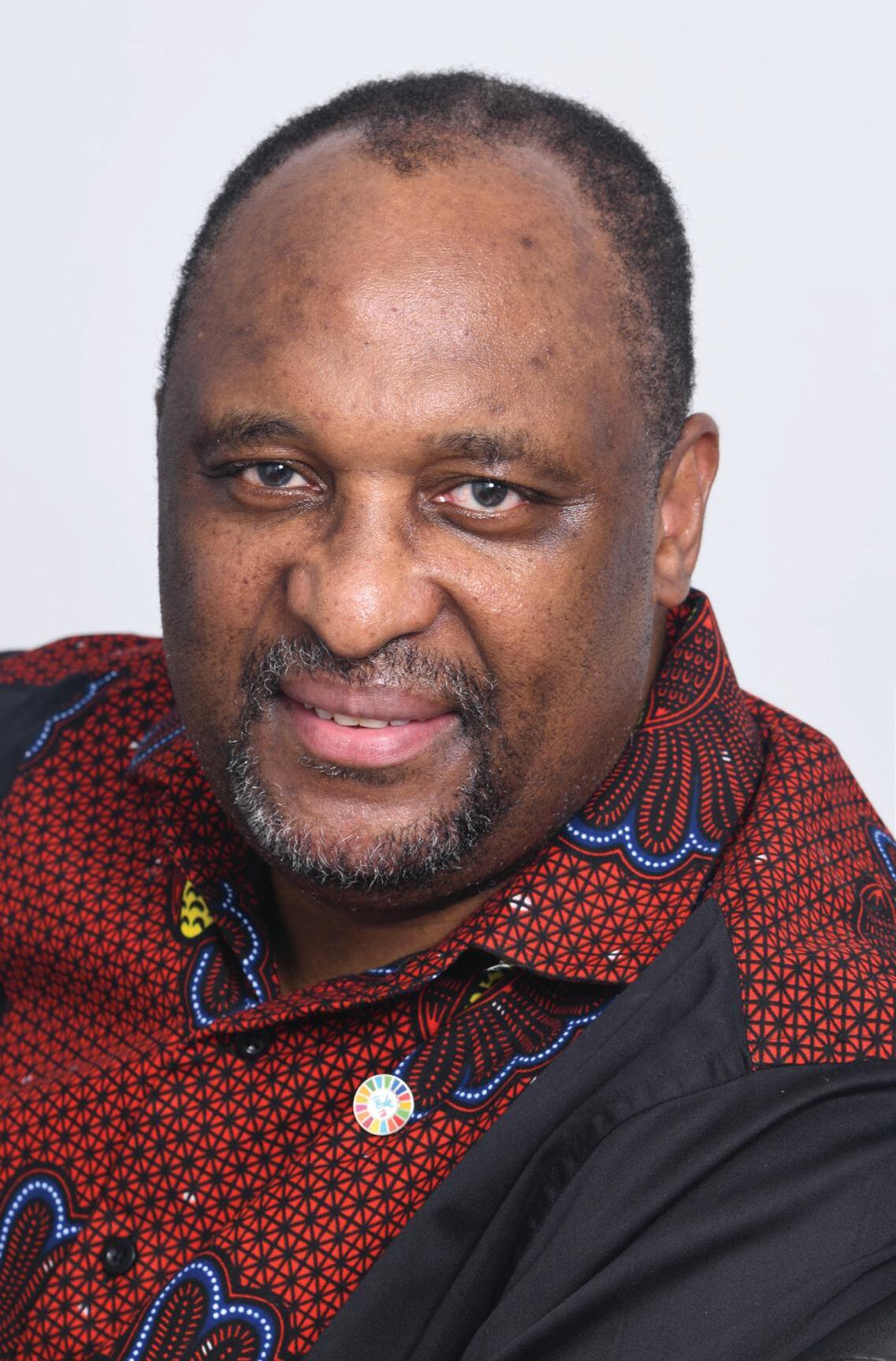
000 in 2022, our treatment coverage has reached 77% for the first time. However, we still experience a high death rate and a high loss to follow up,” said Ndjeka.
While the drug resistant (DR-TB) data system has been very helpful, Ndjeka said drug susceptible TB data system has had a lot of challenges which the country department is attending to.
Other achievements include the introduction of a 6-month multidrug-resistant TB (MDRTB) regimen for all eligible individuals in the country.
“MDR-TB was traditionally treated for 24 months, we reduced the duration of treatment to 18 months around 2014. In 2017, we introduced the 9-month regimen with injectable component; in 2018 we maintained the 9-month regimen with all-oral agents. Being the first country in the whole world to do so.
“In 2023, On September 1st, we introduced a 6-month alloral regimen for all who are eligible, which translates to more than 95% of our drugresistant TB annual cohort,” said Ndjeka. ❖
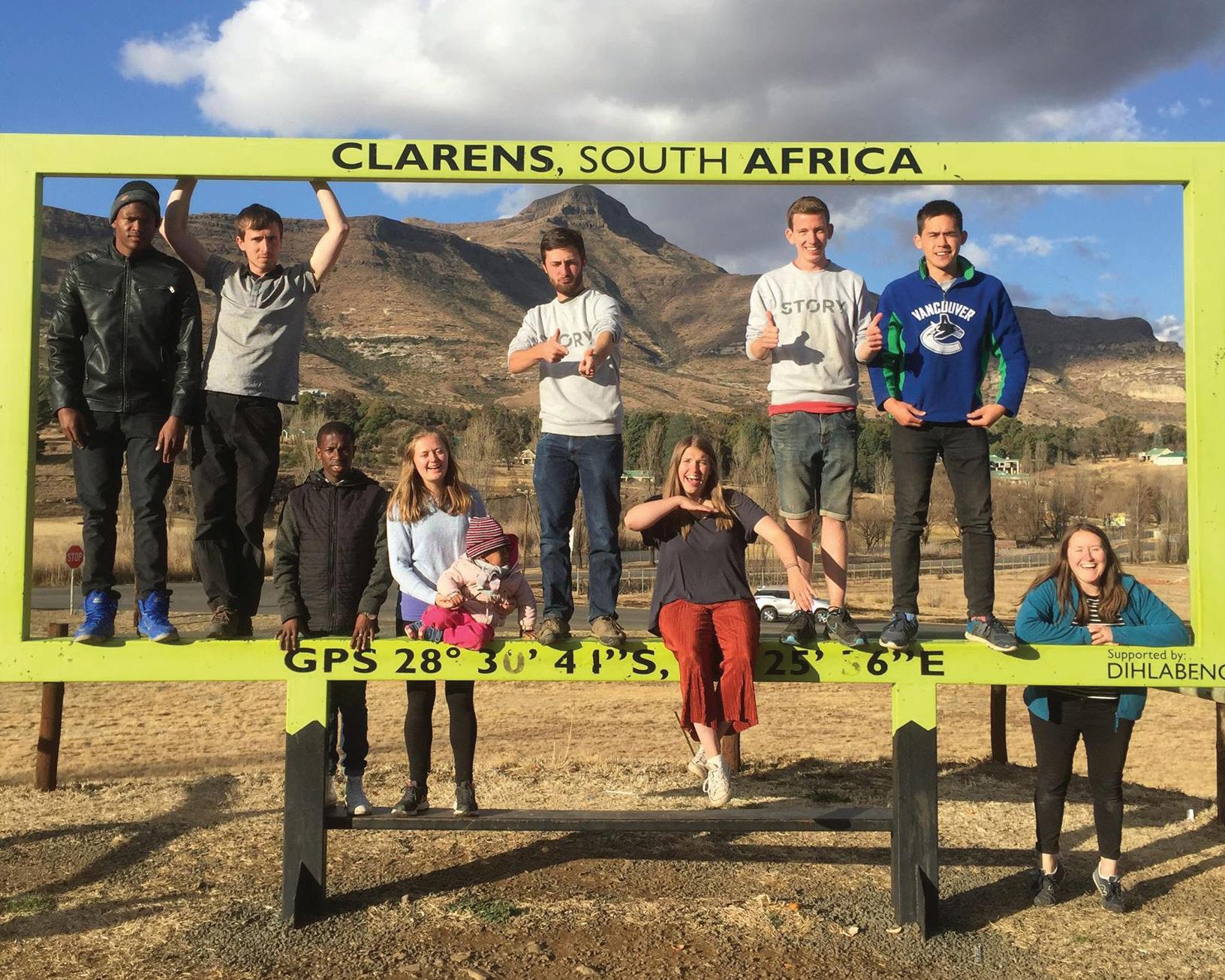
Eskom has announced that the Free State town of Clarens, in the eastern part of the province, has become South Africa’s first town where residents are now equipped to manage their own electricity load through load curtailment.
Eskom Free State Senior Manager for Retail, Bibi Bedir, explained that although many municipalities and large customers have been engaging in load curtailment, “group curtailment – where a community manages its own load curtailment – was piloted in Clarens”.
“Group curtailment requires the collaborative efforts of the entire community to reduce load when requested. Once a system emergency is declared, Eskom gives a nominated group coordinator two hours’ notice of load curtailment that should be sustained throughout load shedding. The group coordinator directs the community who decides which equipment will be switched off to achieve the required demand reduction.
“For the residents of a tiny town that depends on an economic inflow from tourists visiting their small businesses mostly over weekends and holidays, power interruptions due to load shedding required a solution that would allow the
town’s economy to thrive while still contributing to a reduction in electricity demand when the national grid is under strain,” Bedir said.
The town’s nominated group coordinator, Gert Kruger, described the move as “life changing” for businesses in the town.
In Clarens, curtailment compliance is managed through an application that was developed by a company managed by Kruger, which signals to customers that load curtailment has been called.
“For a town that depends on tourism, not being subjected to load shedding is life-changing. Although the success depends on the voluntary participation of residents and businesses, we have the community’s support as everyone benefits from cooperating.
“Feedback from visitors, restaurants and accommodation establishments is very positive and without the noise of generators, tourists can enjoy Clarens’ natural beauty,” Kruger said.
Monitoring compliance Eskom explained that during curtailment Stages 1 to 4, customers are asked to reduce electricity demand by some 10 to 20%.
“Unlike load shedding, where the customers are switched
off as per their schedule, load curtailment must be sustained. Eskom continuously monitors the reduction in demand of its curtailment customers, as three instances of non-compliance will result in the reinstatement of normal load shedding,” the power utility said.
In Clarens, curtailment compliance is managed through an application that was developed by a company managed by Kruger, which signals to customers that load curtailment has been called.
“[This] acts as a trigger for residents to set their load reduction plans in motion. A meter was installed at the town’s main point of supply. Every 60 seconds, the meter sends real-time statistics of the town’s current demand, prompting further reduction if required.
“So far, the project is successful with residents being able to sufficiently reduce and manage their load, making the Clarens project a benchmark for similar projects to be rolled out in other areas of the country.
“For a town that depends on tourism, not being subjected to load shedding is life-changing. Although the success depends on the voluntary participation of residents and businesses, we have the community’s support as everyone benefits from cooperating.
“As Clarens is already gearing up for smart city initiatives with smart metering and electrical vehicle charging stations already installed, as well as a welldiverse spread of small-scale embedded generators (SSEGs), Eskom was eager to help Clarens' residents in the evolution from an art town to a smart town,” the power utility said. ❖ –SAnews.gov.za
We've come a long way but still have far to go
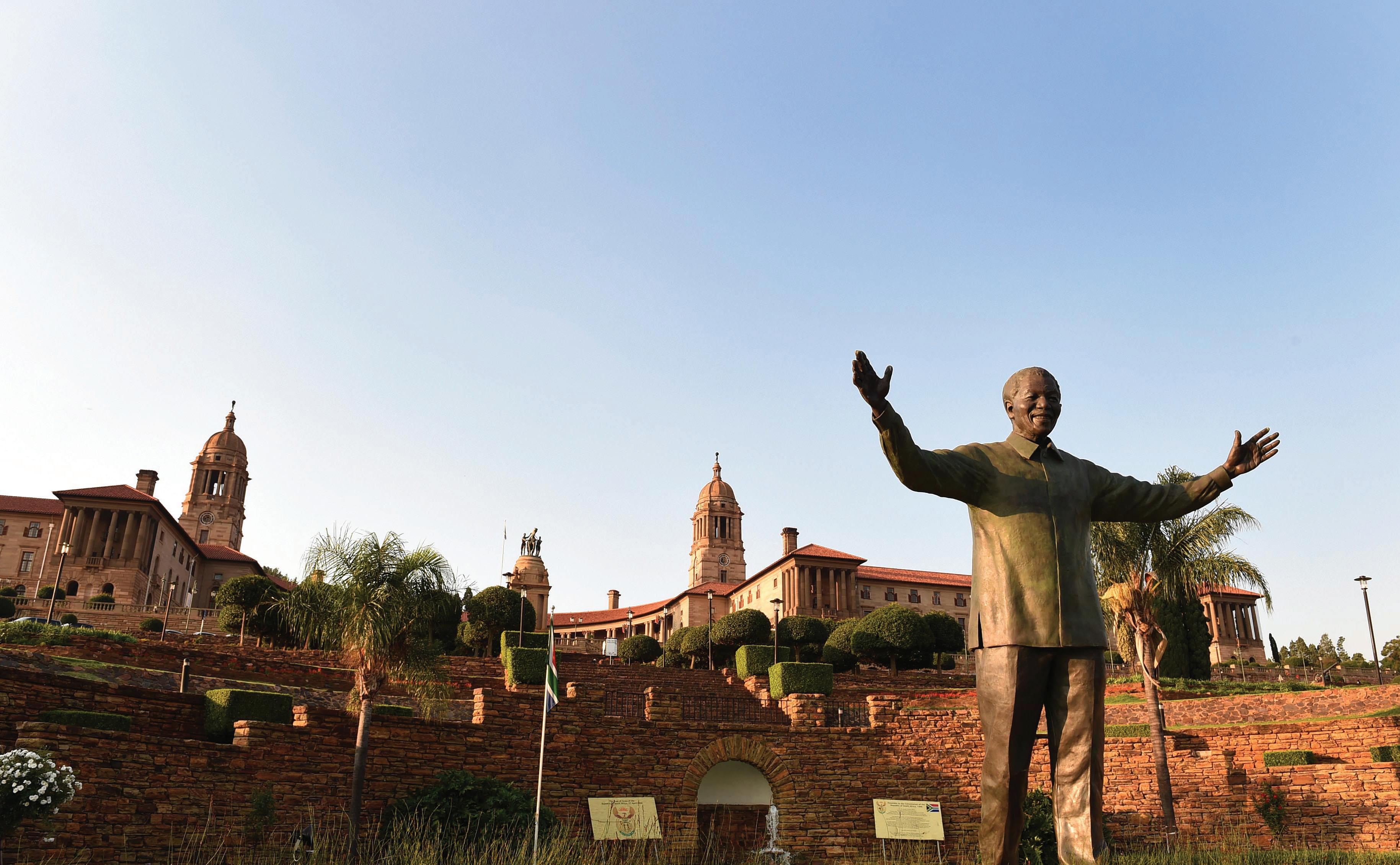
The upcoming celebration of 30 years of freedom and democracy in 2024 provides South Africans from all walks of life the chance to reflect on what it was like to have lived in apartheid South Africa. It is also an opportunity to reflect on the changes that have taken place since 1994, the challenges that remain, and the way forward for the country.
We have made significant progress in transforming the apartheid state into a democratic one founded on the values of human dignity, non-
racialism and non-sexism, the rule of law, and universal adult suffrage, as enshrined in the Constitution.
We have created a vibrant democracy where the lives of all people are valued, and indeed protected by democratic institutions. The independence of our democratic institutions, which is guaranteed by the separation powers is a hallmark of our democracy.
Living in South Africa in 2023, it is however easy to forget just how different life was prior to 1994. In 1994, the new demo -
cratic government inherited a society with gross inequalities across every aspect of life as a result of apartheid’s policies that systematically excluded black South Africans to the fringes of society.
Basic needs were neglected, and things we now take for granted such as access to water, electricity, housing, education and healthcare were mostly unavailable for the majority. Every part of society back then was highly fragmented and structured to serve only a small portion of the population.
This was the stark reality faced by the democratic government in 1994, and since then we have worked to ensure that the basic needs of people are met by providing housing, water, electricity and telecommunications.
The stark disparities at the time were brought to light by the first democratic Census in 1996, which showed that of the 6,5 million households headed by black Africans, 2,8 million used electricity, 2,5 million used candles and 1,1 million used paraffin for lighting.
The results from Census 2022 shows that the proportion of households using electricity as the main source of energy for lighting now stands at 94,7 percent, and the use of paraffin and candles, which was a mainstay for many prior to 1994 has markedly decreased to almost negligible levels.
A similar picture emerges in water and the results from Census 2022, show that over four-fifths, 82,4 percent of households in the country had access to piped water either inside their dwelling or inside their yard.
In 1996 only 31,1 percent of black African-headed households had access to a flush or chemical toilet. While in 2022 people who had access to a flush toilet stood at 70.8 percent.
These and many others are some of the material changes that have occurred over the past 29 years, and we should rightly be proud of the progress we have made as a young nation.
Another major success of the democratic government has been the expansion of our social welfare net, and major advances in health and education. The Census 2022 results show that our social welfare system has made a huge difference in the lives of the poorest households, especially
schoolchildren by ensuring that no one slips below a minimum standard of living.
Our basket of social services includes free basic services, education and social housing for the poor, as well as an extensive social security grants system.
We have also ensured that we implement a health system that is responsive to the needs of people. We have the world’s largest HIV treatment programme, and millions of South Africans who previously had no hope now live productive lives due to our massive rollout of ARV treatment. Treatment has led to an increase in life expectancy and low levels of mother-to-child HIV transmission rates.
The strides we have made in education and literacy have also been remarkable. In 1980, the overall literacy rate in South Africa stood at only 76.2 percent, while In 2021, the literacy rate in South Africa reached 95.33 percent. The matric pass rate in 1995 was only 53.4 percent and increased to 80.1 percent in 2022, and in 2021 an incredible 256 031 (36,4 per cent) of learners obtained a Bachelor level pass. It is also notable that enrolment in public universities has increased from 494 356 in 1994 to over a million in 2023.
This is not to pretend that we
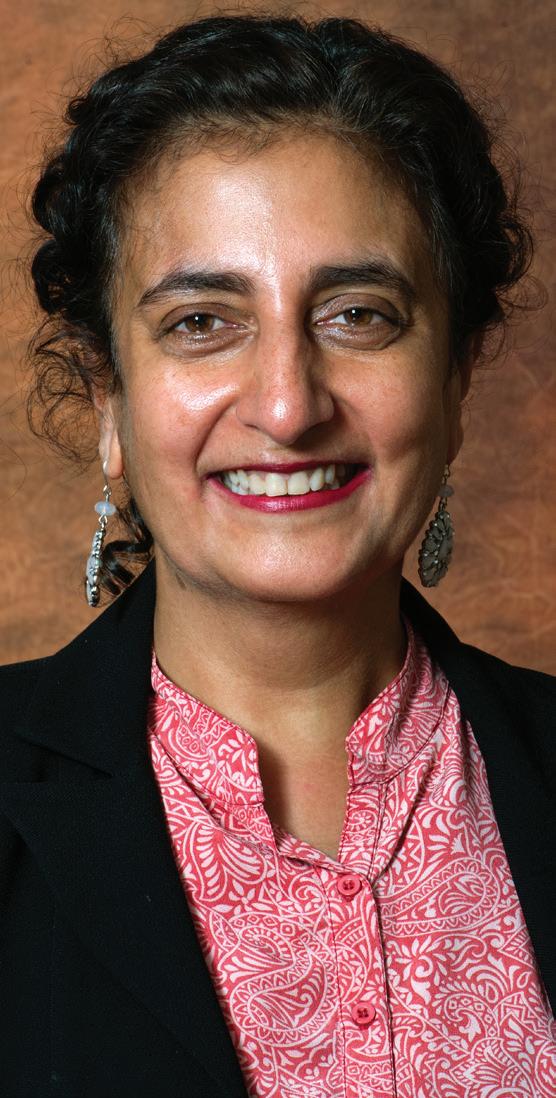
still have deep challenges facing us. The triple challenge of poverty, inequality and unemployment remain our biggest challenges. We must not forget the devastation imposed on our society and government by HIV/AIDS, Covid-19, the state capture years and international conflicts that have shaken our economy. Corruption from both private and public sectors continue to rob our society of real development.
While we know that more must still be done to meet the ambitious targets we have set for ourselves, the progress we have made shows that our development is not by chance, but rather by design from government programmes since 1994. Despite the many head-
winds we have faced, especially since COVID-19 we remain a society on the move.
Of course, our trajectory since 1994 has not been without many challenges. But, what has remained clear is the ability of South Africans to rise above adversity and to pull together in our darkest hours.
The story of South Africa has always been about our people and now more than ever the collective future resides in the hands of the people. While addressing a rally in Durban, on 25 February 1990, former President Nelson Mandela once famously said:
“Since my release, I have become more convinced than ever that the real makers of history are the ordinary men and women of our country. Their participation in every decision about the future is the only guarantee of true democracy and freedom.”
These powerful words are a reminder that democracy has always been about the people, and citizens are at the heart of making it stronger. Let us therefore reflect on our 30-year journey and together find ways to take our nation to even greater heights.
Previously published on TimesLive website. ❖
Tasneem Carrim is the Chief Director Policy and Research at the GCIS.
Through social media apps, websites, and other digital tools, the internet gives us a lot of ways to connect with each other. This makes information easy to find.
However, the ease with which we get information online makes it hard to determine how true it is. The COVID-19 pandemic is a great example of this challenge because knowledge spread very quickly through our phones and social media sites.
During this dark time, scary fake news spread very quickly, making it harder for people to get the right information and stay safe, which was bad for their health and made them less likely to trust others.
In order to fight fake news, the South African government set up many ways for people
to easily get true and accurate information. This included the SA Coronavirus website, social media accounts, and regular updates for the whole country.
Because of the pandemic, government learned that giving people easy access to reliable information gave them the tools they needed to make smart choices about how to protect their health.
Building on the success of spreading information widely during COVID-19, government has adopted a multi-media approach that uses all forms of media to give South Africans more power by giving them accurate information about problems facing the country,
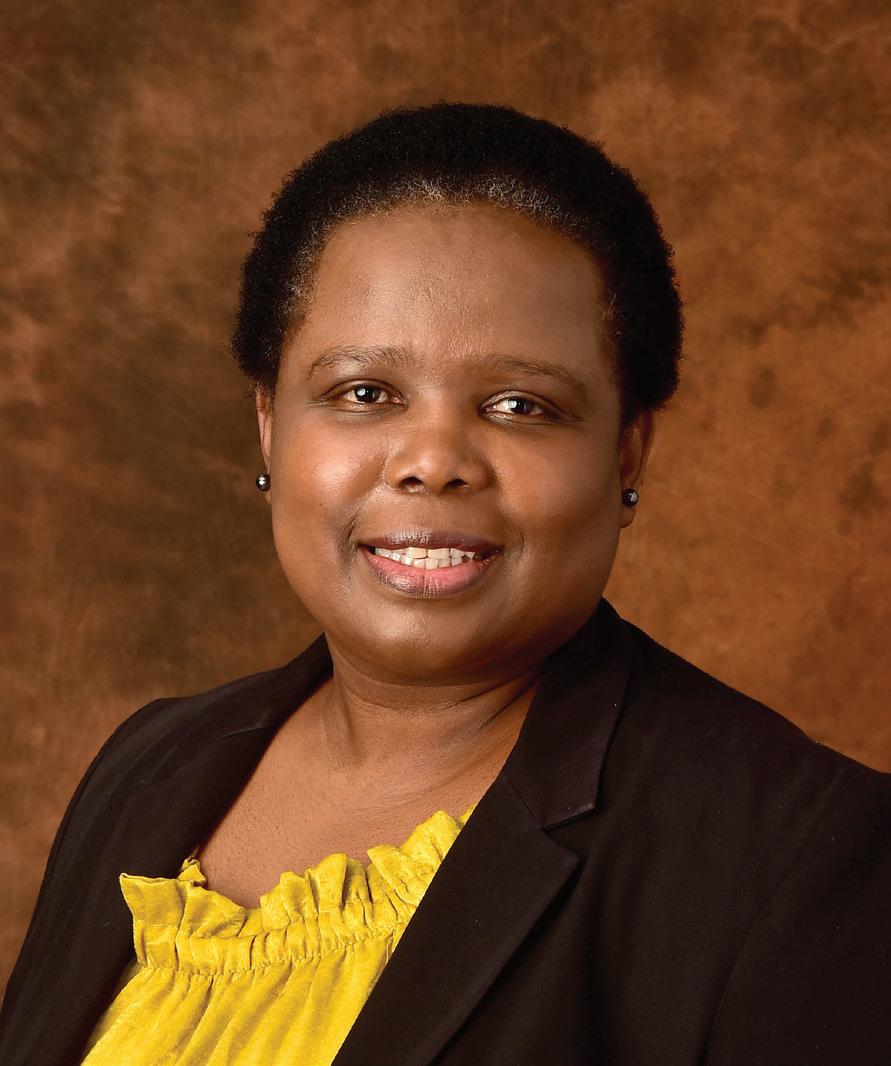
the government's solutions, and programmes meant to bring about change.
Government just recently set up two WhatsApp channels, governmentza and the PresidencyZA, that people can follow to get regular updates on things that affect everyone, like chances for legal education and work.
This adds to government’s social media platform GovernmentZA, which lets people get true information right away and talk to the government directly. People should follow these social media pages on Facebook, Instagram, LinkedIn, TikTok, WhatsApp, X, and YouTube, as well as government websites like https://www.gov.za, https:// www.gcis.gov.za/, and https:// www.thepresidency.gov.za/, to
get accurate news about issues that affect the whole country.
The GCIS also has its own in-house news agency, SAnews (https://www.sanews.gov.za/) which provides regular news updates on matters of public concern, at no cost. In addition the GCIS launched a podcast, Vuk Talks to give people more access to information about government programmes. It’s on YouTube and Spotify.
Our online presence adapts to the changing needs of our citizens, but we also make sure that people who don’t have access to the internet can still get information.
The government tries to get accurate and reliable news to millions of people in rural areas and townships. Over the years Vuk’uzenzele newspaper has
touched the lives of many people. It also brought the government to closer to the people through Izimbizo and partnerships with local community radio stations. From April 2024 on, the newspaper will only be available online, but its articles will still be useful to everyone in South Africa. We have also partnered with SABC 2 on the 13-part series Citizens Connect in an attempt to educate more citizens.
All of these online platforms let people to easily get reliable information directly from the government about their lives, our country, and the world we
live in. Reliable information is essential to make democracy work. The opposite is equally true: inaccurate information, often a result of fake news, can be dangerous to democracy, especially during big national events such as elections.
As the seventh national and provincial elections get closer, people are being warned to be careful of fake news online, especially since new technologies make it hard to tell the difference between fact and fiction. With the rise of deep fake content, fake content can seem credible. Dishonest people use Artificial Intelligence (AI) to make fake videos, pictures, and audio recordings of other people. Public figures, such as our political leaders, are often
the targets of these attacks.
Be vigilant at all times Government urges every citizen to be wary of falling victim to fake news. Pay close attention to face features and lip movements that don’t match up on videos because that can be a sign of deep fake content. If in doubt, verify the information you receive via trustworthy information sources (such as government platforms). That’s how you can learn the truth and make smart decisions about your future.

names sound a lot like real ones. So, double-check the writing of the profiles and websites you follow.
If you use social media and websites as sources of information, make sure that they are real. It’s easy to miss fake accounts or profiles because their
Every South African needs to make sure that the news they spread comes from reliable sources. Let’s all stay alert at all times to avoid being duped by fake news. Let’s all play our part to make our democracy strong. Let’s fight disinformation. ❖
Zanele Mngadi is Acting Chief Director: Products and Platforms at the GCIS
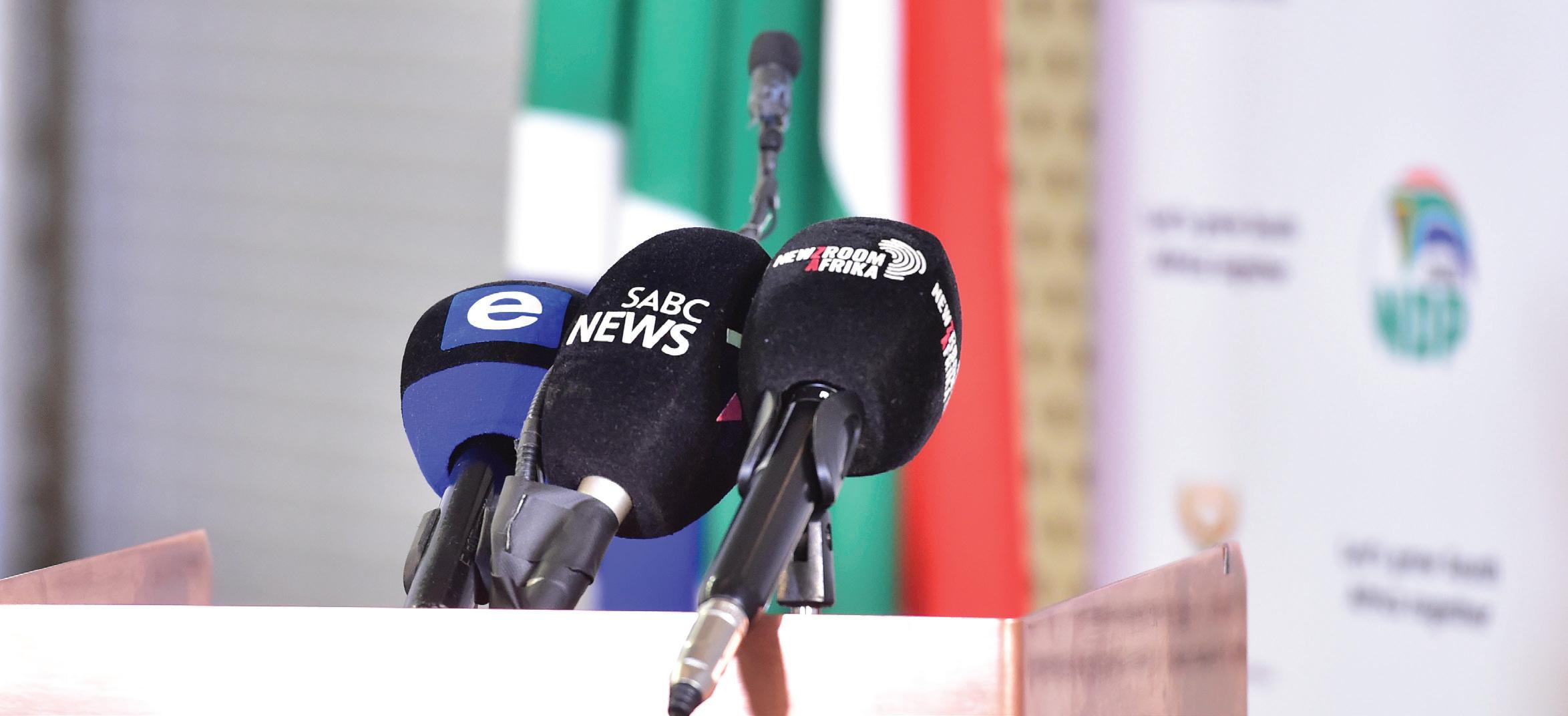

2024 has already kicked into full gear and as is the case with every new year, it often brings an ignited spirit of ‘new year, new me’.
With sluggish economic growth and inflation driving prices high-
er and higher, South Africans continue to experience financial pressures.
It’s time for you to get ahead of the game and make 2024 a year to remember. Let’s explore a few tips on how to build your own
foundation to a solid financial freedom.
1. Explore zero-based budgeting options
It always starts with a strong, well-planned budget. Con-
sider a zero-based budget.
This simply means assigning each rand you earn to a specific purpose, resulting in a balance where your income minus your expenses equals zero. Doing this effectively
requires you to make a comprehensive list of all your expenses, including the money allocated for savings, entertainment, emergency funds and investments. This approach encourages mindful spending, but it is also flexible in that it allows you to adjust your budget each month to reflect price increases or new expenses.
2. Use automated budgeting apps
Leverage technology by using budgeting applications to make your life a bit easier. Popular apps like Mint can assist with tracking your daily or monthly spending. By categorising transactions, they can provide further insights into your financial habits.
3. Create emergency fund allocations
Having an emergency fund is important. Start by setting aside a small portion of your budget - this can be as little as 10%. Over time, this amount will accumulate and can minimise your reliance on credit in an emergency. Think of it as a safety net, one that will protect your
budget and quality of life when the unexpected happens. A smart choice is to use a savings that not only gives you an extremely competitive interest rate, but immediate access to your cash as well. Just resist the temptation to dip into it.
4. Save!
Savings are a must-have feature of any budget. By regularly putting money aside, you can build the financial muscle needed to reach your goals. Think of your savings as an investment in yourself and the life you would like to live. Here are a few tips that will help you to get the most out of your savings.
Pay yourself first
Treat savings as a non-negotiable expense. Set aside a percentage of your income to savings before addressing other expenses, then automate the procedure so that you aren’t tempted to spend it. Set yourself a savings goal. A well-defined goal will keep you motivated to continue saving.
Create separate savings
pockets for different goals, such as emergencies, travel, or major purchases. This helps you to stay organised and focused on specific objectives.
Explore the power of group savings!
Consider joining a savings group, like a stokvel. A stokvel refers to an account that facilitates the coming together of a group of people to save towards a shared goal. The benefit is the greater amount of interest earned on the larger amount invested by the group. By contributing a fixed amount
regularly, whether it’s saving for travel, weddings, or renovations, you will be able to build a supportive network with shared financial aspirations.
Building a strong financial foundation is an ongoing process that requires dedication and strategic planning. By addressing budgeting dilemmas, such as spending habits and savings, you empower yourself to make informed money moves throughout the year. Let this be the year that you take control of your financial destiny, laying the groundwork for a successful and prosperous future. ❖

The Presidential Climate Commission (PCC) has welcomed the announcement of the establishment of the Climate Response Fund, as announced by President Cyril Ramaphosa during the 2024 State of the Nation Address (SoNA).
The fund is aimed at addressing the devastating effects of climate change on the environment, infrastructure and lives.
PCC Deputy Chairperson Valli Moosa said the commission will provide oversight for the fund, which it believes should be administered independently.
“As a commission, in light of our previous calls for increased domestic and international funding for climate action, we commit to actively support the conceptualisation of the fund mechanism, its funding sources and how it can carry out its
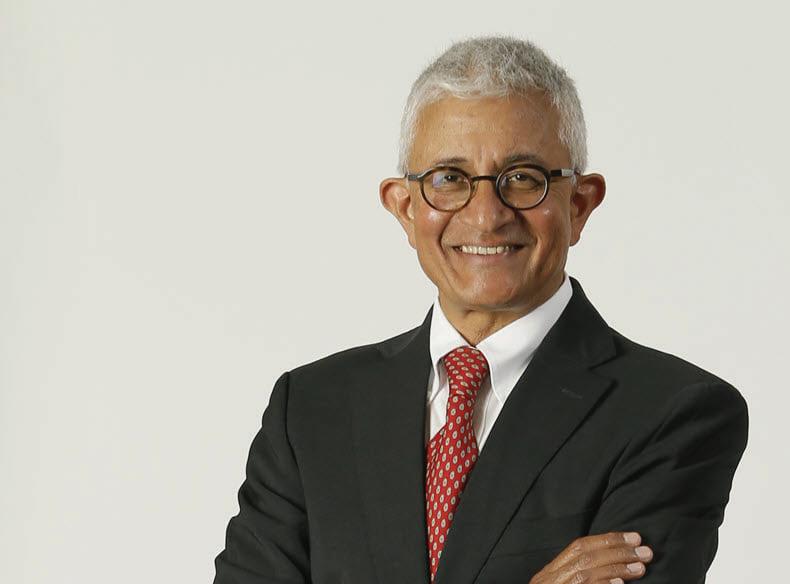
functions efficiently,” Moosa said.
The PCC said the Climate Change Bill – which has already been approved by the National Assembly and is currently in the National Council of Provinces (NCOP) for consideration – will pave the way for a “new era in implementing an effective climate change response” for South Africa.
“[It will] support a just transition to a climate-resilient, equitable and internationally competitive low-carbon economy and society, which considers the risks and opportunities expected to arise in implementing the national climate change response.
“The commission calls upon all social partners and stake -
holders to actively participate in the envisaged public hearings on the Bill by the NCOP, and reaffirms its support to the House processes in reaching out to South Africans during the public hearings and consultations,” the PCC said in a statement.
The commission also weighed in on the Global Stocktake decision adopted at the 28th United Nations Conference of Parties (COP28) held in Dubai, 30 November - 12 December, 2023.
“The commission welcomed the Global Stocktake decision, framed as the 'UAE consensus', which called for an ‘all of economy,’ ‘all of society’ approach to tackling climate change, and achieving a just transition through a transformative development pathway,
which includes tripling renewable energy, doubling energy efficiency, accelerating sustainable transport, transforming the food system, and protecting forests and nature.
“The agreement to establish a fund for Loss and Damage was an early win this COP, with financial commitments of approximately $700 million pledged. While this is an important initial contribution, it falls far short of what is needed by developing countries and the outstanding issues such as how it will be funded moving forward.
"COP28 adopted a Just Transition work programme, with a broad interpretation of a just transition i.e. the just transition demands an all of economy and all of society response," the PCC said. ❖ – SAnews.gov.za
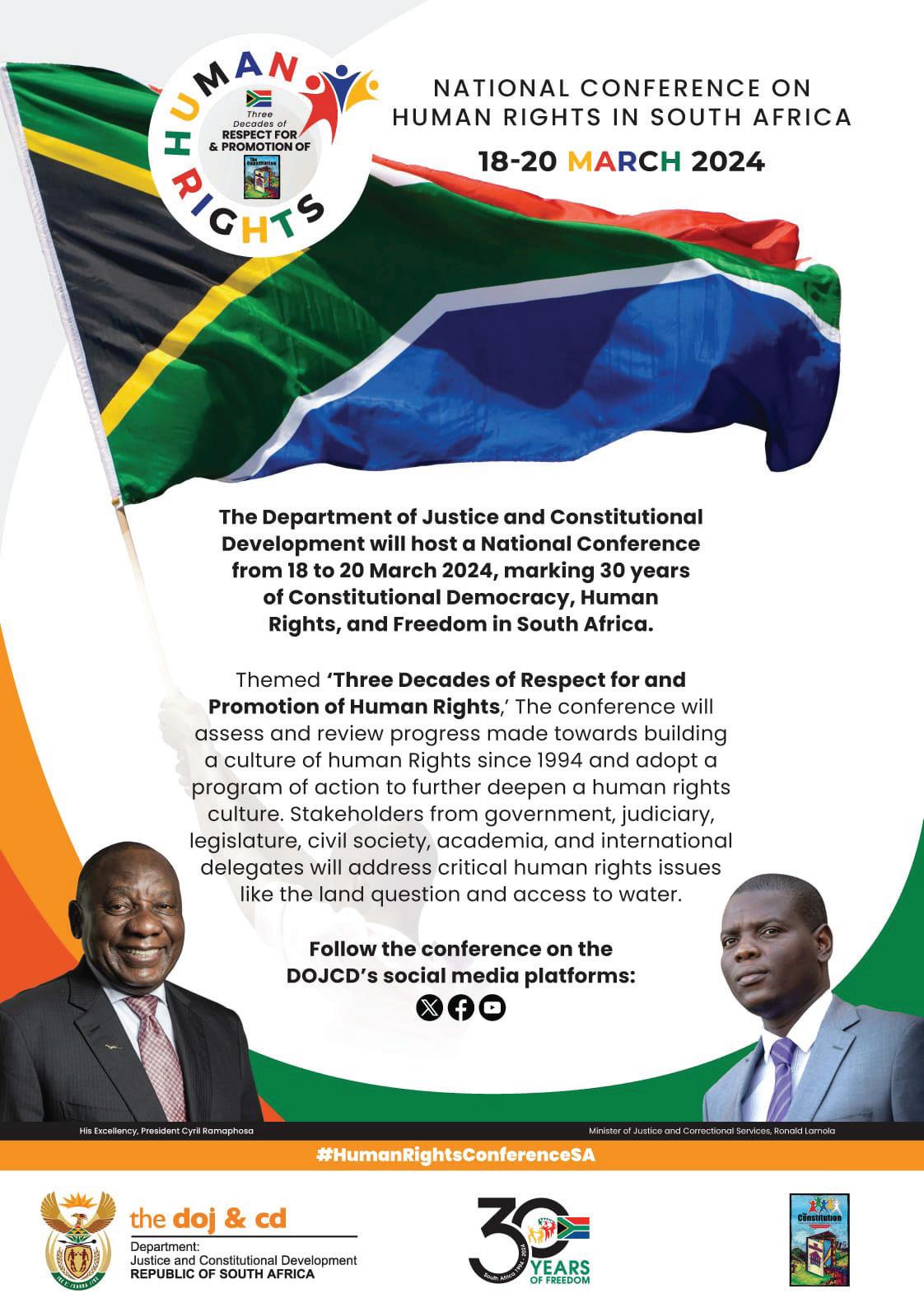
Even if one does not usually pay attention on a daily basis to the ins and outs of government and the political landscape in the country; the flurry of activities within this domain over the past few weeks could hardly be missed.
Invited into our living rooms have been the country’s number one citizen President Cyril Ramaphosa delivering his State of the Nation Address (SoNA) on our TVs; various political parties responding to that Address, and then of course the President again in his reply to those debates.
I should stop here to remind all that we will be seeing all of this again in a few months' time, after the National General and Provincial Elections, as in an election year, these Parliamentary proceedings happen twice. Heads up to make plans for those TV snacks in advance! With all of us entitled to our own views, there have been - as it should be in a robust
democracy such as ours - varied responses to the President’s address which sets out deliverables for the year ahead while also setting out government’s key policy objectives. After all, the state of the country does concern each and every one of us.
While the political parties represented in Parliament responded to the SoNA on the national stage, citizens have probably expressed their opinions to each other on the train-ride or minibus taxi to work or at the dinner table.
Others have done so on various social media platforms and in many cases expressing their frustration with the pace of service delivery.
The sixth administration which came to the helm in May 2019, has not had it easy. It is an administration that had to deal not only with the COVID-19 pandemic and its effects on everyday life, but also challenges SA had been facing prior to the

arrival of the pandemic - such as poverty and unemployment.
However, in delivering the SoNA, and in reflecting on the last thirty years of our country’s democracy, the President said that perhaps “the greatest damage was caused during the era of state capture.”
This as the effects of state capture continue to be felt across society, “from the shortage of freight locomotives to crumpling public services; from the poor performance of our power stations to failed development projects.”
We must admit that it can’t be easy to turn the fortunes of
the country around, especially one that comes from a history of inequality that is still a part of our social fabric today.
I’m not suggesting that we ought to blame the past for all our current challenges. However, as in most cases in life, the past does have a bearing on the present. No matter how hard one tries, it cannot be ignored. The past which excluded the majority, reminds government, said the President of the “responsibilities that freedom has placed on our shoulders to forge ahead to realise for all South Africans the promise of a better life”.
While the reference to Tintswalo, the child of democracy is in some quarters being criticised, exacerbated by challenges such as corruption , Tintswalo is no figment of the imagination.
In the eyes of some members of the public, the story of Tintswalo is one of young people unable to find work, unable to complete their studies due to outstanding fees or being held under the thumb of genderbased violence, amongst others.
unquestionably, the reality is that the Ghost of Christmas Past, masquerading itself in the form of poverty and unemployment amongst others, continues to hamper government’s efforts.
However, what remains is that the Tintswalo President Ramaphosa spoke of, is real.
Born in 1994, she grew up in a society governed by a constitution rooted in equality, the rule of law, and affirmation of the inherent dignity of every citizen. She grew up in a household provided with basic water and electricity, in a house where her parents were likely to have lived without electricity before 1994.
While the Tintswalo of today faces a world different to that of the past, government is committed to bettering the lives of its people.
In the SoNA debate reply, the President noted that despite the contributions made at the debate, “no speaker has been able to refute the fundamental reality that the lives of millions of South Africans have been transformed over the 30 years of freedom.”
Government has and continues to make progress in various aspects of everyday life.
This includes the introduction of the National Minimum Wage, which guarantees the minimum floor below which no worker may be paid, which was introduced for the first time in the country’s history in 2019.
The sixth administration also oversaw the successful raising of the R1.51 trillion worth of investments over the last fiveyear period through the South Africa Investment Conference (SAIC) that the President announced in 2018.
Held annually over the past five years, the SAIC surpassed the initial R1.2 trillion target to reach the R1.51 trillion in investment pledges.
The transformation of South
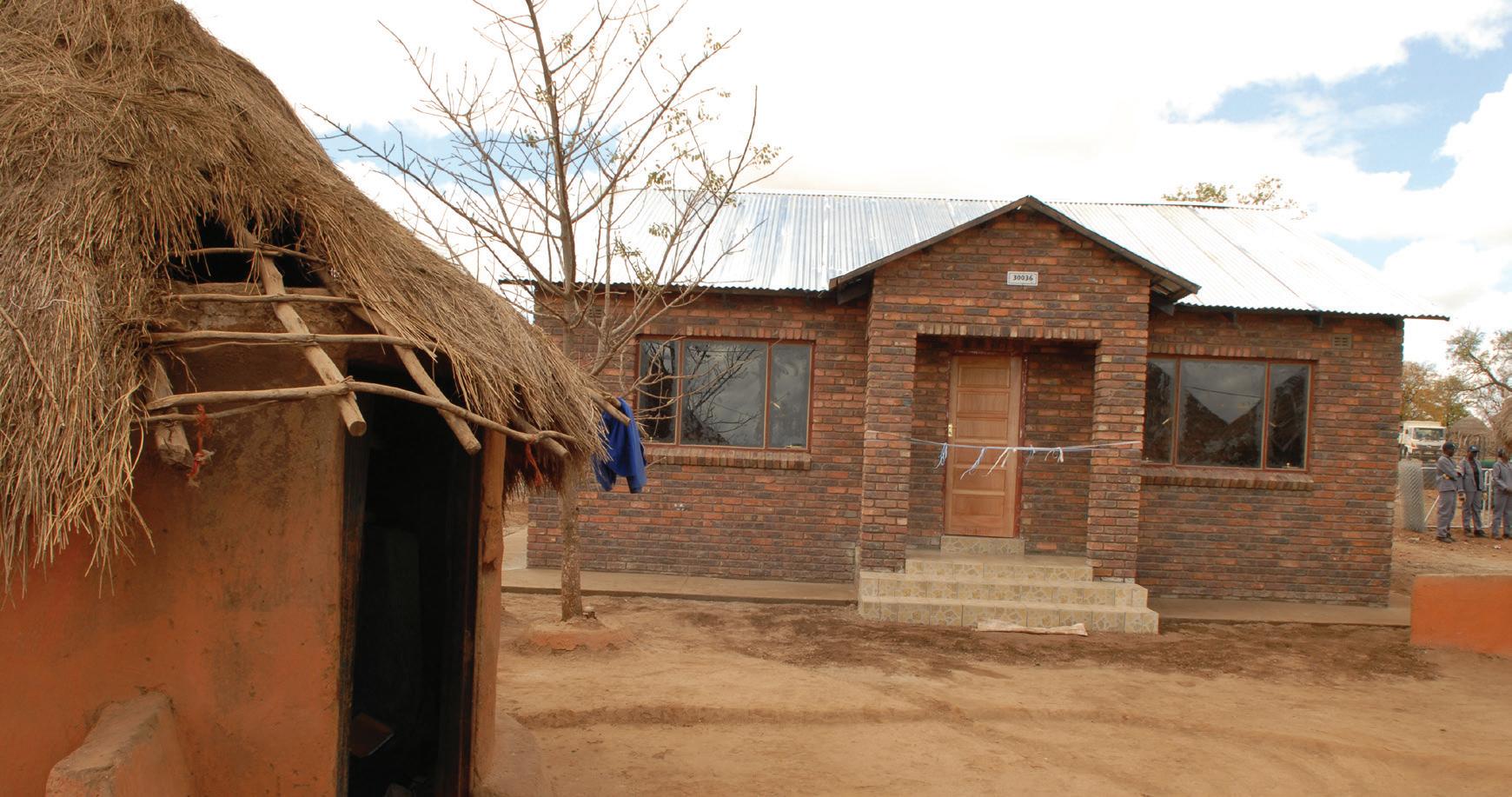
African lives can be found in the Census 2022 results which among others showed that access to electricity for lighting increased from 58% to 95% between 1996 and 2022 as well as 82.4% of households having access to piped water either inside their dwelling or inside their yard.
Additionally, by November 2023, the 20 specialised South African Police Service Economic Infrastructure Task Teams that were set up to work with business, private security and state-owned enterprises to tackle illegal mining, construction site extortion, cable theft and vandalism of economic infrastructure, had made arrests.
The teams had made over 4 000 arrests for damage of critical infrastructure, 70 arrests for extortion at construction sites and over 3 000 arrests for illegal mining.
With my popcorn in hand, watching the President deliver his address, my bite on this one was clear - the journey of a better South Africa has not been perfect, but succumbing to our challenges is not an option. As South Africans, let’s continue to show up for ourselves and for our country. ❖
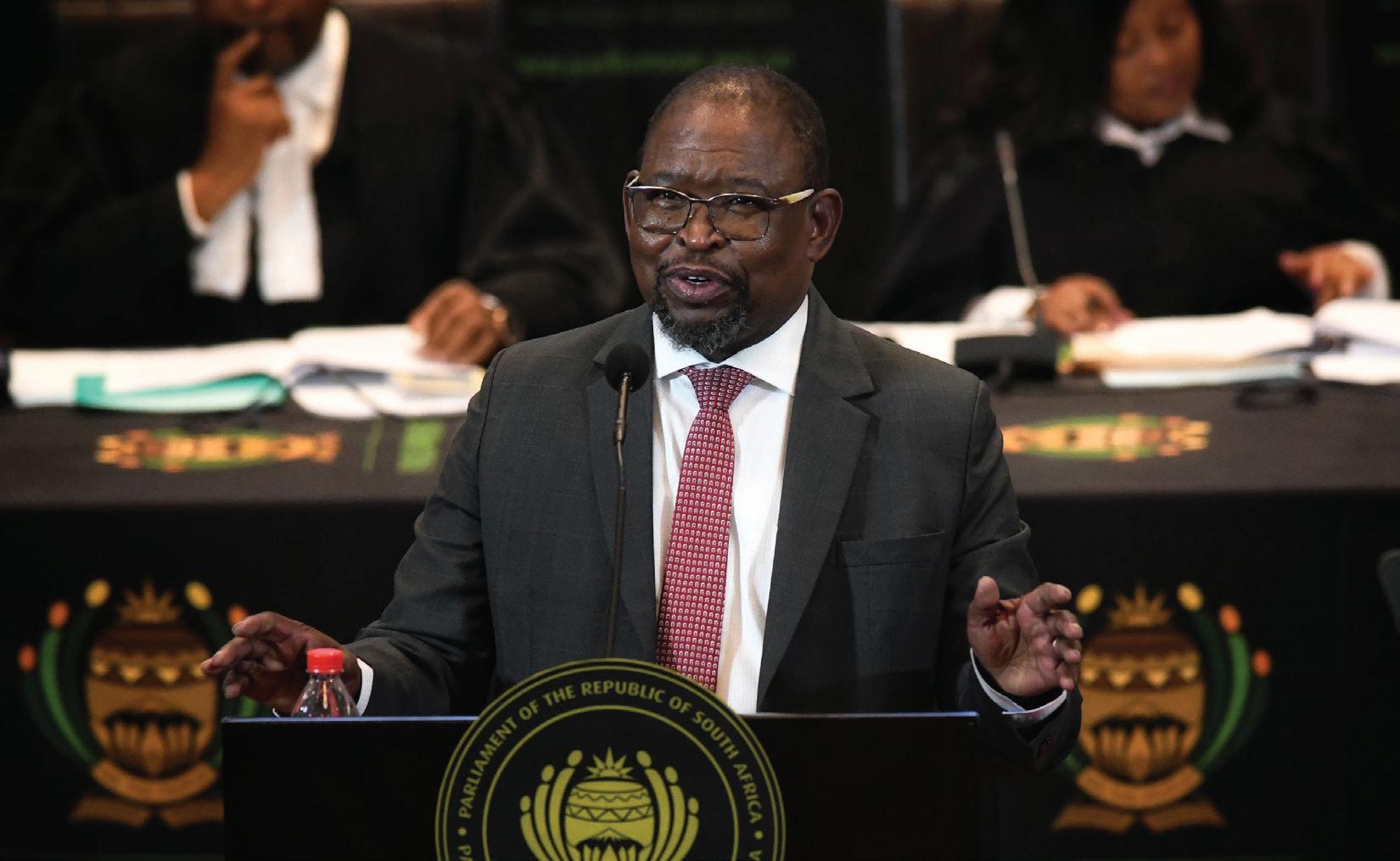
Acombination of high debt servicing costs and a higher budget deficit has led to the introduction of a new reform of the Gold and Foreign Exchange Contingency Reserve Account (GFECRA). GFECRA is a Reserve Bank account that captures gains and losses on South Africa’s foreign currency
reserve transactions and the account has grown to more than R500 billion.
The reform is aimed at mitigating fiscal risks by reducing government borrowing in the medium term and will allow government to draw down from its GFECRA held at the Reserve Bank.
This was announced by Finance Minister Enoch Godongwana during the tabling of the 2024 Budget Speech in February in Cape Town.
“We will draw down R150 billion of the GFECRA balance once we have ensured that sufficient buffers are available to absorb exchange rate
swings and the solvency of the Reserve Bank is not compromised,” he said.
The drawdown is expected to result in a decline of some R30.2 billion in government debt servicing costs over the 2024 Medium Term Expenditure Framework. Minister Godongwana explained that national government debt is expected to peak at some 75.3% of the Gross Domestic Product (GDP) in 2025/26 with 2023/24’s budget deficit estimated to worsen to 4.9 % of GDP.
Debt-service costs in 2023/24 have been revised higher, by R15.7 billion to R356 billion.
The Minister said this would require that government stick to its fiscal goals with cuts in expenditure reaching more than R80 billion. “Debt-service costs will absorb more than 20% of revenue. To put this into perspective, spending on debt-service costs is greater than the respective budgets of social protection, health or peace and security.
“A net reduction of R80.6 billion in non-interest expenditure is being implemented over the medium term. At the same time, revenue has been revised up by R45.6 billion over the medium term relative to [the] 2023 MTBPS [Medium Term Budget Policy Statement]. [This is why] we have taken the decision to introduce a reform GFECRA,” he said. ❖ – SAnews.gov.za
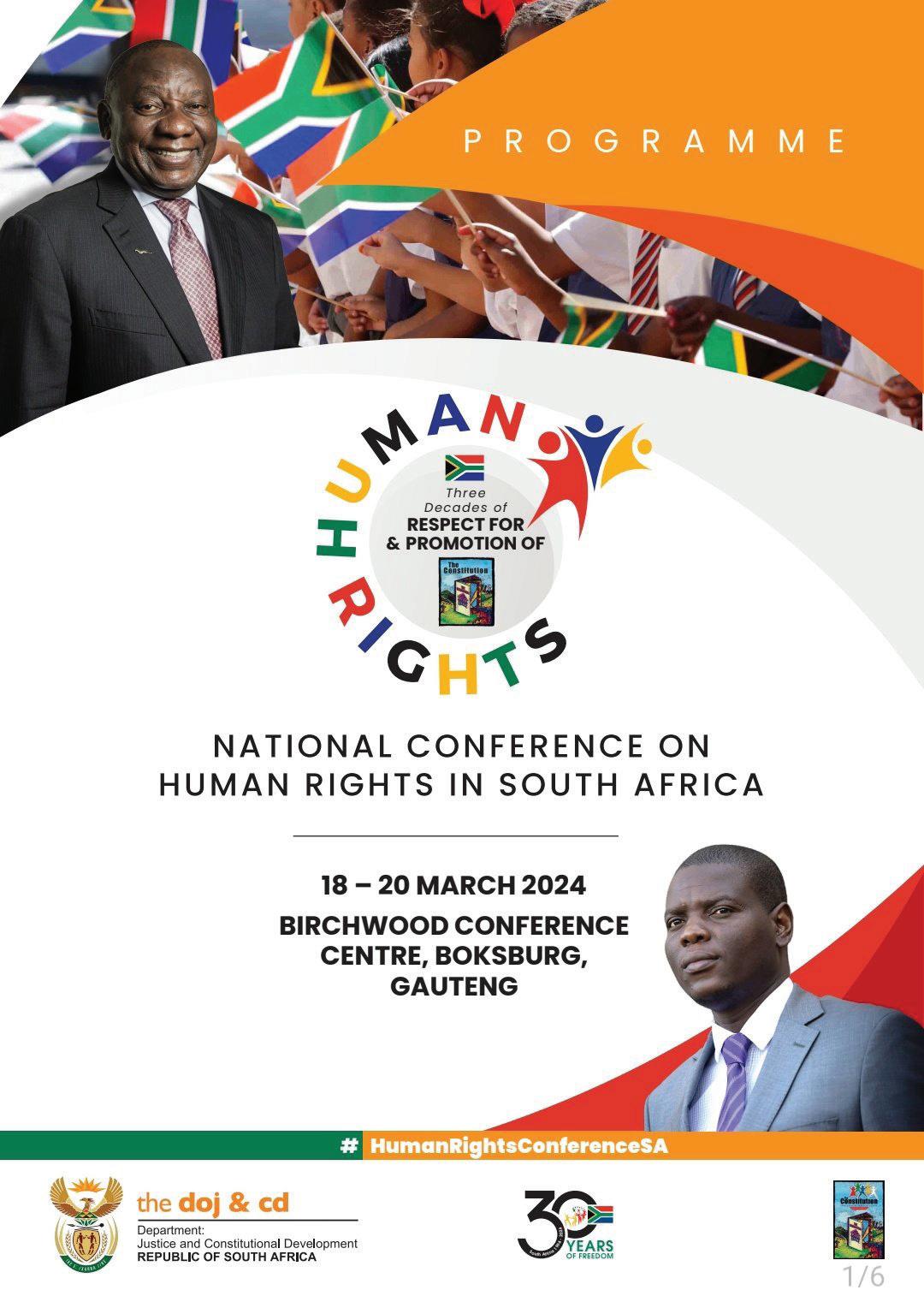
In strides toward reshaping the landscape of our public service, the Department of Public Service and Administration has introduced the Directive on Human Resources Management and Development for Public Service Professionalisation. At its core, professionalisation empowers public servants and upholds fundamental human rights, ultimately leading to a culture of excellence.
This directive, based on the National Framework towards the Professionalisation of the Public Service, represents a leap towards a public service that is accountable, efficient, and citizen-centric.
Professionalisation is the cornerstone of our vision for a transformed public sector. It is an opportunity to empower our public servants with the skills, knowledge, and ethical standards necessary to deliver exceptional services to citizens. The

is an endeavour that will
redefine our public service and
a culture of excellence.
Also at the core of this directive
lies the commitment to meritbased and inclusive recruitment practices. We believe that the strength of our public service lies in attracting and retaining the best talent through transparent and unbiased selection processes. By focusing on qualifications, skills, and competencies, we create a level playing field that ensures fairness and equal opportunities for all. This approach will foster a diverse and dynamic workforce that reflects the true fabric of our nation.
Continuous learning and development are paramount for our public servants to adapt to the evolving demands of service delivery. The directive emphasizes the importance of a culture of lifelong learning, where individuals are encouraged and supported in acquiring new skills and knowledge. By investing in the professional growth of our workforce, we equip them with
the tools needed to navigate complex challenges and provide innovative solutions. This commitment to continuous improvement will enhance the quality and relevance of the services we deliver to the public.
A robust performance management system is essential to cultivate a culture of accountability and excellence. The directive calls for fair, objective, and transparent performance management processes that recognize and reward outstanding performance while addressing underperformance. We aim to create an environment that motivates our public servants to excel and to hold them accountable for their actions by implementing these systems. This will ultimately lead to improved service delivery and restore public confidence in our institutions.
Ethics and integrity are the pillars upon which a professional public service stands. The directive places a strong emphasis on upholding ethical standards and ensuring their rigorous enforcement. We aim to cultivate a culture of integrity and trust by setting clear guidelines and mechanisms for ethical behaviour. Our public servants must act as beacons of integrity, demonstrating a commitment to ethical conduct in all their endeavours. This commitment
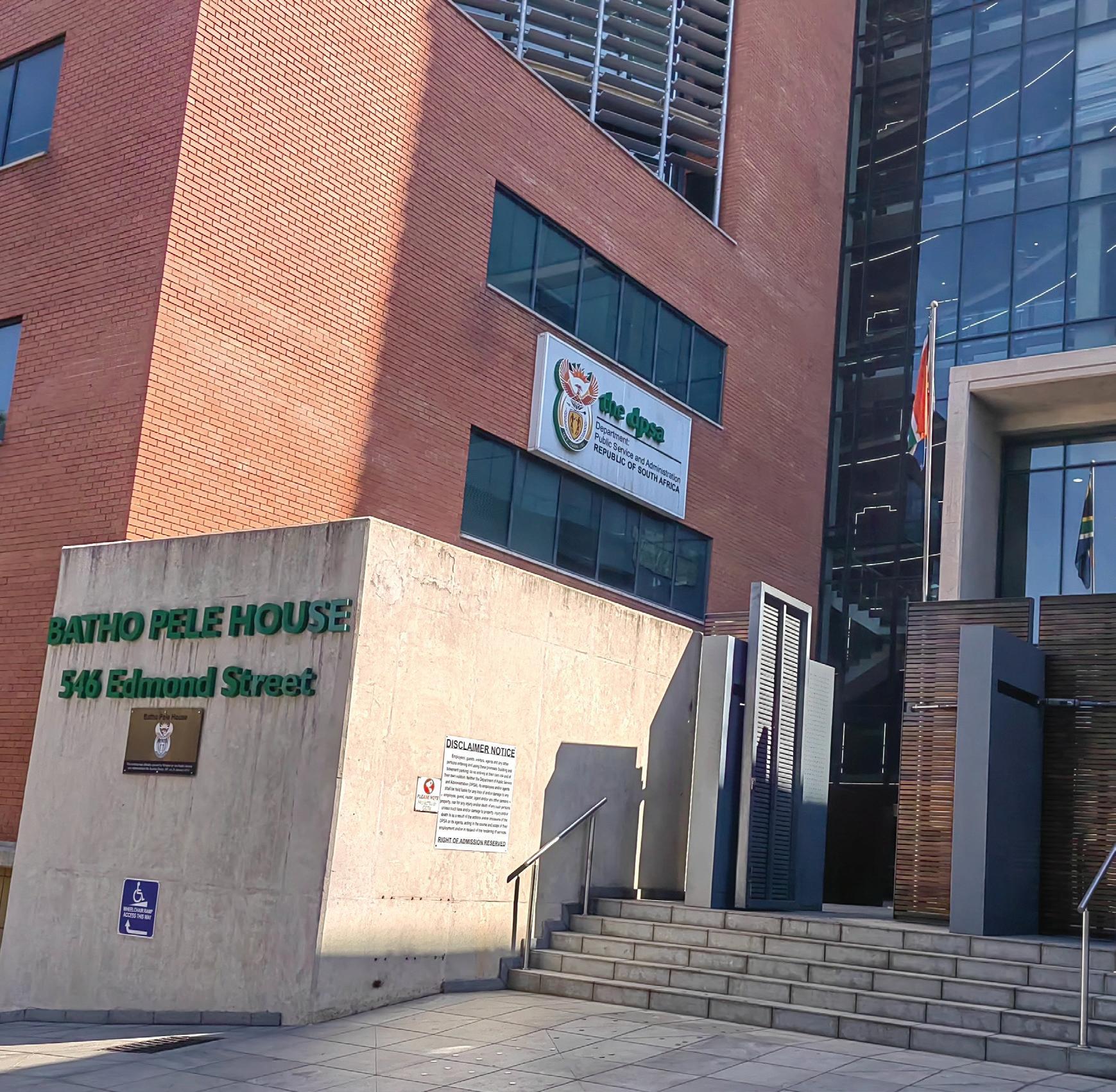
will restore and reinforce the public's trust in our government institutions.
The Directive represents a turning point in our journey towards a public service that is accountable, efficient, and citizen-centric. It is a call to action for all stakeholders, departments, and public servants to embrace this transformative directive and work collectively
to bring about the change our nation deserves. Let us unite in our commitment to a professional, competent, and ethical public service that serves as the driving force behind our country's progress. Together, we can build a future where our public service stands as a shining example of good governance, meeting the needs and aspirations of our
citizens and upholding fundamental human rights. The time for transformation is now, and I am confident that with the implementation of this directive, we will usher in a new era of accountability and excellence in our public service. ❖

As South Africa celebrates 30 years of freedom and democracy this year, we feature a recipe by Chef Tlali Masakala who graduated from the National Youth Chef’s Training Programme (NYCTP) in 2011.
The programme was established through a partnership between the National Department of Tourism and South African Chefs Association to address the need for cooks and chefs in South Africa’s hospitality industry.
It aims to equip young, unemployed people with skills to become chefs.
Masakala is one of the beneficiaries whose recipe made the cut in the department’s the MaSisulu Recipe book, titled #MaSisulu100 in 2018.
“The NYCTP has changed my life and enabled me to follow my passion. In 2014, I was the only South African to be awarded the world-renowned and coveted City & Guilds Gold Medal for Experience in the culinary arts,” he said.
The City & Guilds Gold Medal
for Experience is a global initiative that recognises the achievements of learners, lecturers and trainers who produces exceptional work.
“I am grateful to heroes like Ma Sisulu (South African anti-apartheid activist) for paving the way so that we have the educational opportunities such as the NYCTP initiative,” he said.
He dedicated his Chilli Mopani Worms Veg Tal recipe in memory of Ma Sisulu’s legacy:
• 3 tablespoons of oil
• 4 cloves garlic (minced)
• 1 large onion (finely chopped)

• 3 tablespoons of tomato paste
• 3 large of tomatoes (diced)
• 3 cups of fresh tomato (pureé)
• 4 cups of water
• 2 large of carrots (diced)
• 3 cups of Mopani Worms (soaked in hot water for 10 minutes and washed thoroughly with warm water)
• 2 cups of bulgur wheat (partly cooked)

• 1 large green pepper (diced)
• 1 stalk celery (diced)
• 3 red or green chilies (optional)
• 2 tablespoons of paprika
• ½ teaspoon of ground cinnamon
• 2 tablespoons of ground coriander
• 1 teaspoon of ground cumin
• 1 teaspoon of cocoa powder
• 1 cup of pearl barley (cooked)
• 1 cup of red kidney beans (tinned)
• 3 tablespoons of chutney
• Salt and pepper for taste.
Method:
• Heat the oil in a pot.
• Add onion, garlic, green pepper, celery and chillies.
Fry for 3 minutes.
• Add paprika, cinnamon, coriander, cumin, cocoa powder and tomato paste. Fry for another 3 minutes.
• Add diced tomatoes, tomato pureé and hot water.
• Let it simmer for 30 to 40 minutes.
• Add carrots. Once the carrots are almost cooked.
• Add Mopani worms, and cook for 10 minutes.
• Add bulgur wheat, pearl barley, red kidney beans and chutney.
• Season with salt and pepper. ❖
You can follow him on Instagram:
@tlali_masakala

Marakele National Park, situated approximately two hours from Johannesburg, makes the perfect quick escape to the bush for the weekend. Here are a few reasons why:
Plentiful African wildlife can be found in Marakele National Park, and visitors can expect to see magnificent creatures such as elephant, black- and white rhino. Predators such as brown hyena, leopard as well as lion
can also be spotted. Guided game drives are available and are undertaken in an open safari vehicle with a driver/guide who has extensive experience and intimate knowledge of the area and is an expert on the game movement and other ecological aspects of the region. Game drives usually depart in the early morning and late afternoon, when it is cooler for the game to hunt and graze, so there is a better chance of encountering abundant wildlife.
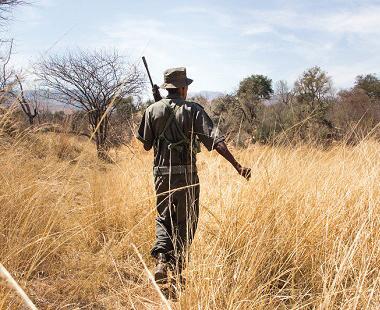


Our professionally trained field guides cater for guests' preferences and fitness levels to create an outstanding wilderness walking experience.
This National Park is a birding haven, where visitors can see numerous bird species. Perhaps the biggest attraction is the largest colony of Cape Vultures in
the world (around 800 pairs) so dont forget your binoculars.
Explore and experience the Waterburg Mountain’s rugged terrain. 4 x 4 Eco-Trailis a three day outdoor adventure traversing the wilderness.
Indulge in the unequalled experience of a traditional African braai by warm firelight.. Watch the sunset beyond the savannah as an experienced guide helps you search for wildlife at dusk before arriving at the feast in the middle of the bush. ❖

